#what is this? America? 1984?
Text
Lol my mum couldn’t buy me a drink at the pub bc I didn’t have id. Girl who cares
#even if I were under 18 I’m here w my parent who is buying it for me#it being one pint of cider…. girl#what is this? America? 1984?#to be clear this is hyperbole for comedic effect but like#we used to be a proper country#misc
5 notes
·
View notes
Note
also about autoCAD! according this rant an older engineer gave me, architects didnt start using autoCAD/other autodesk products until the 90s, when autodesk realized that if they got architects to use their products, everyone else had to lol
YEAHHH!! i found that too, it's buried somewhere in my 1700 words of author notes on tumblr LOL. grian, in this au, is pretty much like most people of the time period in that he knows basically nothing about computers and has probably never used one since they weren't particularly common, but he will very soon or over the course of his career need to learn since architecture is 100% a profession that uses autoCAD. he's going to get dragged kicking and screaming into the computer world sdflsjfsk
I had a fun little dive down the rabbit hole into CAD technologies while writing this chapter. I think I went into the story under the main assumption of "ah, it's the 80s, they don't have any modern technology" but that's not quite true, is it? It's the late 80s, for one--we're one year from being in the 90s. They're very much on the cusp of all of that technological innovation. Also, computer technology has generally existed far longer than most of us think, it just wasn't necessarily accessible to most of the public.
So while I was looking into CAD, I realized it was entirely possible for Mumbo to be learning it for his job in engineering. AutoCAD was released in 1982, which was directly in the middle of when he probably went to college in this AU. However, I don't know if he would have been taught it in his degree at that time since it was so new. He could, however, learn it from his job. I know that at my job one of the reasons I do most of the InDesign and ArcGIS work for my team is "ah, she's young enough to figure all that computer stuff out." I would not be surprised if that happened to Mumbo too. His bosses are probably like "fantastic he's young AND he's interested in it let's train him to do it" sdfjslfskl
Someone else mentioned CAD in one of my comments on AO3 so I was looking it up too. Something I didn't even know: the first 3D CAD product was released in 1987. Additionally, Boeing announced in 1988 that they would use a CAD software to design their 777 aircraft, which was the first aircraft to be designed entirely digitally. I read a different article about that that stated Boeing had used CAD in their engineering process for a few years before deciding to do it fully digitally, so it was definitely part of many company's "process" already within the 80s.
#quara asks#i wrote this whole post like i actually know how to use CAD#i do not i am not an engineering student or an architect#in my degree i was only taught GIS#i just like going down rabbit holes#im not sure if i mentioned grian and mumbo's ages in this story--they're both about 28#(theyre about the same age because i had them as going to school together)#my very rough estimate for mumbo's graduation is like 1984 so that's what i was working with#grian probably graduated also in 1984 but you need a two year's certificate to Actually be an architect so he wouldve got that in like 1986#presumably by 1986 i think they might have moved to the US at that point (mumbo was offered an engineering job in america by his employer)#so basically if we put 1988 as the year Everything Went Wrong for grian. he was just a lil baby architect barely out certification#thats why in the first chapter he doesnt want to skip work to go with mumbo because he's being given his own clients for the first time :]#i have thought. perhaps excessively about this au#hc_firewatch_au
14 notes
·
View notes
Text
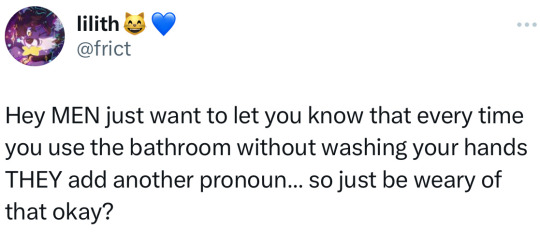
yet another banger from my oomfie 🔥
0 notes
Text
One Six (1/6) Signing
January 6th is a day that no one will soon forget.
That’s why Alan Jenkins, civil rights attorney turned Harvard Law professor, decided to write a story about what might have happened (What If… for your Marvel fans) if 1/6 had turned out differently - if the insurrectionists had accomplished what they set out to do.
It’s a dark future painted (well, drawn) by Will Rosado that starts off how many of us remember the event to go but takes a hard right turn (pun intended) into a militaristic, dystopian future.
About the book:
Written by Alan Jenkins and Gan Golan and illustrated by Will Rosado, 1/6 asks and answers the question: What if the January 6, 2021 Insurrection had been successful?
The graphic novel chillingly illustrates how close we came to authoritarian rule in America and the threats to our democracy that we still face. In the tradition of speculative fiction from George Orwell’s 1984 to Margaret Atwood’s Handmaid’s Tale to the Twilight Zone, it explores themes of autocracy, scapegoating, strategic disinformation, and more, all told through a compelling, character-driven story.
Drawing on real-life events, 1/6 travels the road that led from back-room meetings, white supremacist rallies, and the Four Seasons Landscaping parking lot to a violent attack on the Capitol that left several Americans dead and shook our nation to its core.
It then imagines a world in which the events of that day turned out very differently.
1/6 is for lovers of graphic novels, lovers of speculative fiction, lovers of politics, and lovers of our democracy. It’s a story that demands our attention and calls on us to take action…while we still can.
Issue #1 will be available and Alan and Will will both be on hand to sign copies, discuss why this book is so important to understanding where we are, where we’ve been and costs and implications of where we are (could be) headed. It’s all of our hope (the creators and East Side Mags) that this comic will foster conversation and communication.
From a Washington Post article about the book:
Jenkins says creating an alternative American history is a way to engage people of varying political views. “One of our storytelling efforts is to have empathy for everyone,” he says. “That doesn’t mean everyone is right or that there’s moral equivalence, but we need to understand each other.”
We hope you’ll join us on July 1 from 2pm-5pm for a signing unlike any other East Side Mags has hosted to date.
#Alan Jenkins#civil rights attorney#Harvard Law professor#story#What If#dark future#Will Rosado#militaristic#dystopian#future#Gan Golan#graphic novel#authoritarian#America#threats#democracy#speculative fiction#George Orwell#1084#1984#Margaret Atwood#Handmaid's Tale#Twilight Zone#autocracy#scapegoating#strategic disinformation#compelling#real-life#Americans#politics
1 note
·
View note
Note
Neil, do you like the 1986 Little Shop of Horrors movie? If so, what's your favourite song from it, and which ending do you prefer? (Bonus question, have you ever met Steve Martin?) Thanks, hope you're having a good week!
I like it but I do not love it. I love the Theatre Play (and saw it with Ellen Greene in London in 1983 or early 1984) and have seen it brilliantly done and less brilliantly, and always loved it.
I think the reshot ending is a better ending for that movie than the original version. (It always works onstage because these are actors and we know they didn’t die. In the movie they are our heroes and they can’t die.)
Favourite song, depends. Today it’s Somewhere That’s Green because I watched a video of Jinkx Monsoon performing it last night.
I met Steve Martin in 2007 at the Town Hall in New York when we were both reading at the PEN America Event. I remember hanging out with him and Don deLillo and Salman Rushdie at one point but no longer remember whether we were doing anything more than making awkward author small talk.
2K notes
·
View notes
Text
Okay I'm riled up about this rn so time for a history of economics lesson (rant) from me, a stranger on the internet
I'm a communist, I hate capitlism, so lemme just put that out there. But capitlism had its moments. Even marx had some praise for parts of capitlism.
And by far the most successful form of capitlism was Keynesian economics, as evident by the enormous increase in living standards in those countries which adopted it between the 1930s and 1970s.
What's Keynesian economics? The idea that capitlism can't survive on its own, and must be supported by government spending at the poorest ends of society and taxes at the richest ends of society (essentially the opposite of trickle down economics) as well as strong regulations on certain industries like banking.
It basically started in 1936 with President Roosevelt who was a personal friend of John Keynes (who the theory is named after).
Roosevelt implemented Keynesian economics to great effect; he raised the top tax rate to 94% (he actually wanted a 100% tax rate on the highest incomes, essentially creating a maximum wage, but the senate negotiated down to 94%) and similarly high corporate tax rates, he created the first ever minimum wage, created the first ever unemployment benefit, created social security in America, pension funds, and increased public spending on things like public utilities and infrastructure, national parks, etc. Which created about 15 million public sector jobs.
This ended the great depression and eventually lead to America winning world War 2, after which many countries followed suit in implementing similar policies, including UK, Australia, and NZ (apologies for the anglosphere-centric list here but they're the countries I'm personally most familiar with so bare with me)
Over the next 40 years these countries had unprecedented growth in living standards and incomes, and either decreasing or stable wealth inequality, and housing prices increasing in line with inflation. Virtually every household bought a car and a TV, rates of higher education increased dramatically, america put a man on the moon, and so on.
Then it all abruptly ended in the 80s and the answer is plain and obvious. 1979 thatcher became UK prime minister. 1981 reagan became US president. 1983 the wage accords were signed in aus. 1984 was the start of rogernomics in NZ (Someone link that Twitter thread of the guy who posts graphs of economic trends and points out where reagan became president)
(Also worth noting those last two in NZ and Aus were both implemented by 'left' leaning governments, but they are both heavily associated with right wing policies.)
This marked the beginning of trickle down economics: tax cuts, privatization of publicly owned assets, reduction in public spending, and deregulation of the finance sector. The top tax rates are down to the low 30s in most of these countries, down from the 80s/90s it was prior. Now THATS a tax cut.
And what happened next?
Wages stagnated. Housing prices skyrocketed. Bankers got away with gambling on the economy. Public infrastruce and utilies degraded. And wealth inequality now exceeds France in 1791.
I don't know how anyone can deny the evidence if they see it, but there's so much propaganda and false information that a lot of people just don't see the evidence.
Literally all the evidence supports going back to Keynesian economics but now that the rich have accumulated so much wealth it's virtually impossible to democratically dethrone them when they have most of the politicians on both the right and the left in their pocket.
Unfortunately it was the great depression and ww2 that gave politicians the political power to implement these policies the first time around. Some thought the 2008 crash would spur movement back towards Keynesianism (which it actually did in Iceland, congrats to them), I hoped covid would force governments to now, but nope.
All these recent crises' seem to have just pushed politics further and further right, with more austerity and tax cuts.
I don't really have a message or statement to end on other than shits fucked yo.
#also this is purely talking about the economics side of things#i know pre-80s the social side of politics was fucked despite the increasing living standards#with jim crow laws ans segregation and countless anti-queer laws etc.#and i know you canr seperate the economy entirely from social aspects of politics#but for the purposes of this post this is about the theoretical implications of different forms of capitlism#thats also why im not mentioning the recent descent towards fascism even tho it is closely tied to the economy#anyway#so yeah ive been reading a lot on economics lately#capitlism#economy#Keynesian economics#communism
5K notes
·
View notes
Text
The History of Cyberpunk
Or why every other SciFi Genre is called [something]punk
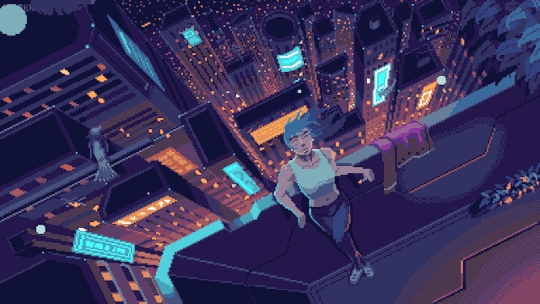
You know what? Let's do this. Because I have seen the discussion on whether or not Solarpunk is "punk" over the last few days and... people really gotta learn their history.
The first time a genre took the "punk" name was Cyberpunk. And for context we gotta talk a bit about the history of the Cyberpunk genre.
While some books that we in hindsight call "Cyberpunk" were released as early as the 1960s, the start of Cyberpunk as a genre got its start in the late 70s and early 80s.
The term was invented by Bruce Bethke, who published a short story in 1983 with the name "Cyberpunk". His idea was to juxtapose the term "punk" for both the mentality and the punk protagonists in his short story with the term cyber, short for the cybernetics they were wearing. And while the cybernetics have become a main stay in the genre, the punk attitudes are not always carried through...
Well, the title Bethke invented stuck, though. When 1984 Neuromancer was published, one of the most influencial works in the early days of the genre, he called it "a Cyberpunk novel" in the marketing. And from there... Well, the genre was suddenly named like that.
The 80s were definitely the decade that had the most influence on the genre, given that a lot of the big novels and graphic novels of the genre were released here.
A big influence was, no doubt, that 1982 the Blade Runner movie had released and had inspired quite a few writers and artists. (And yes, this makes Blade Runner a movie that released not only before the term Cyberpunk was coined, but also before the genre had a chance to define itself.)
Given that the genre was defined in the 80s, there are a lot of 80s anxiety kept within it about the rise of the Japanese economy, that are these days rarely questioned within the western Cyberpunk movement.
When the genre was coined and developed, Japan was the fastest growing economy in the world, being so influencial that they got to buy out several things in America. Something that kinda jerked white people in the US a lot. This is, why Cyberpunk originally depicted not only a capitalist hellscape - but specifically a capitalist hellscape were everything was bought out by Japanese companies, with many of those early antagonists being Japanese companies. And yeah... there was a lot of both anti-japanese racism, but also cultural appropriation of Japanese things in early Cyberpunk, at time surviving to this day. (But that is a story for another day.)
The general sense that Western Cyberpunk had, was always the idea of: We have a capitalist hellscape where the world is slowly dying and people are exploited with no end, while we have those kinda punky protagonists, who stand outside of the society and try to work against it. This being where the punk comes from.
Now, I could talk for length about how a lot of that punky attitude has been lost in more modern Cyberpunk media, but that, too, is a story for another day.
So, let me just talk about what happened then.
The term Cyberpunk really is darn catchy, right? So just when that name took hold, writer K.W. Jeter retroactively called his 1979 novel Morlock Night "steampunk". And guess what: This stuck, too. Though while the 80s Cyberpunk still stuck to the punk attitude, a lot of Steampunk did not. While for certain there is quite a bit of Steampunk that has kinda punky characters go against the quasi Victorian society of steampunk books (something most common in the air pirate novels I have read), a lot of other stories are more focused on a general sense of adventure.
But never the less... The genre names stuck and gave a nice baseline for naming other genre. We got Dieselpunk, Atompunk, Nanopunk, Arcanepunk, Dustpunk, Silkpunk and of course also Solarpunk and Lunarpunk.
And for the most part... The "punk" names mostly communicate: "It is SciFi with this kinda aesthetic/twist going on". Which is just how it turned out.
Funnily enough Solarpunk is for once a genre that brings back the punk, as it tends to include a lot of the ideals aspired to by the Punk counter culture of the 1970s: Anarchism, anti-capitalism, anti-consumerism, anti-classism, anti-racism, anti-colonialism and so on. Though other than with Cyberpunk and the real world punk movement, Solarpunk for the most part imagines a place, where those things are culture instead of counter culture.
I personally find it kinda sad, how for the most part Cyberpunk kinda lost a lot of the counter-cultural, revolutionary mindset. And how fucking defeatist the genre often is.
But again, it is a story for another day. Just as the story of Japanese Cyberpunk is.
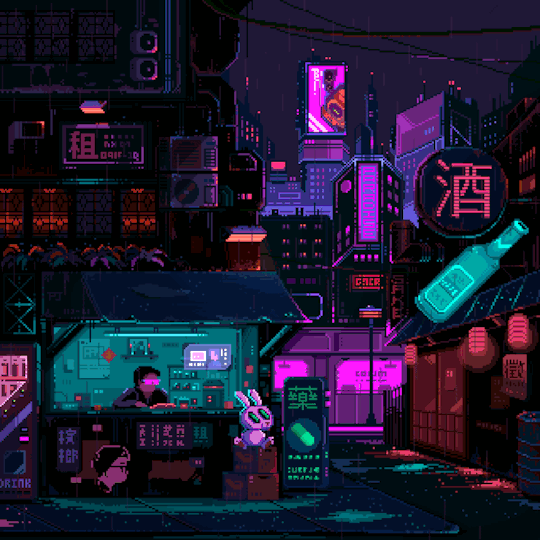
#cyberpunk#solarpunk#steampunk#cyberpunk history#western cyberpunk#science fiction#scifi#william gibson#neuromancer#genre history#punk
431 notes
·
View notes
Text
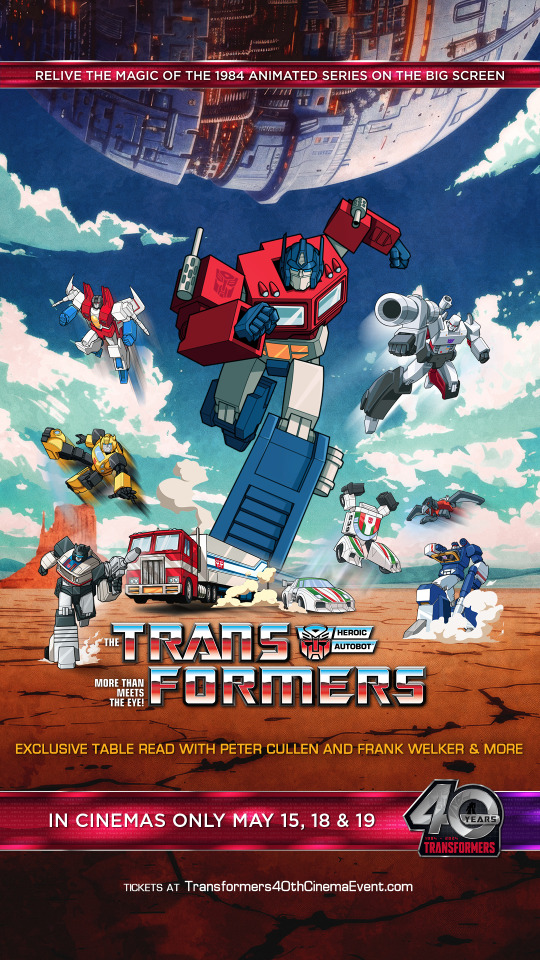
https://newsroom.hasbro.com/news-releases/news-release-details/hasbro-announces-til-all-are-one-transformers-40th-anniversary
40 YEARS. ONE LEGACY.
Relive the Magic of the 1984 Animated Series Featuring an Exclusive Behind-the-Scenes Table Read with Peter Cullen, Frank Welker and Other Original TRANSFORMERS Voice Actors – Only in Theaters Starting May 15
PAWTUCKET, RI — April 3, 2024 — Hasbro Inc., a leading toy and game company, announced today a special cinema experience to celebrate four decades of the TRANSFORMERS franchise with ‘TIL ALL ARE ONE: TRANSFORMERS 40th ANNIVERSARY EVENT. Honoring the brand’s legacy in bringing continuous action and adventure to fans of all ages, the theatrical event will provide limited screenings of episodes from the classic 1984 animated series “THE TRANSFORMERS.” Screenings will be available in select cinemas across the US, UK and Mexico, along with select territories in Europe, Latin America and Asia starting on Wednesday, May 15. Tickets for the TRANSFORMERS 40th Anniversary Event will go on sale at Transformers40thCinemaEvent.com on Wednesday, April 10 at 9.30am Local Time.
This special cinema experience will take fans back to the very beginning as some of the TRANSFORMERS original voice-over talent, including Peter Cullen (original voice of Optimus Prime) and Frank Welker (original voice of Megatron), team up for the first time in decades to revisit their characters and recreate the enduring magic of the classic 1984 animated series. An exclusive behind-the-scenes table read appears on a split screen for the pilot episode, More Than Meets the Eye, Part 1, followed by a traditional screening of the next three episodes of the series. Fans can experience the original Saturday morning cartoon on the big screen and get a glimpse of its evolution with a sneak peek of the new season of the original animated kids’ series TRANSFORMERS: EARTHSPARK. This is a once-in-a-lifetime opportunity to celebrate 40 years of TRANSFORMERS action, humor and legacy at an anniversary event that is truly... More Than Meets the Eye!
“For decades, the battle between the Autobots and Decepticons has come to life in movies, comic books, innovative toys, live experiences and digital media, elevating the TRANSFORMERS brand to a global powerhouse franchise with millions of fans around the world. To celebrate 40 years, we’re bringing fans back to where it all started,” said Alyse D’Antuono, Vice President, Global Franchise Strategy & Management, Action Brands at Hasbro. “THE TRANSFORMERS animated series captured the imagination of fans of all ages when it premiered in 1984, introducing a timeless battle between good and evil fueled by action and adventure. Ask any longtime fan, and they can probably tell you where they were when they first heard Optimus Prime’s iconic phrase ‘Autobots, roll out’ or what it felt like when they first converted a bot character into its alt mode. With exclusive content featuring the series’ original voice actors, this theatrical event is truly for our fans and invites audiences to experience the fun that started it all.”
Distributed by Trafalgar Releasing, the global leader in Event Cinema distribution, this is the second time the company has partnered with Hasbro, Inc., following Peppa’s Cinema Party that screened in cinemas worldwide in February 2024.
For the latest information on the TRANSFORMERS franchise, including toys and entertainment, follow @TRANSFORMERSOfficial on Instagram, @TransformersOfficial on Threads, @TRANSFORMERS on Facebook and @TRANSFORMERSOfficial on TikTok #40yearsonelegacy.
78 notes
·
View notes
Text

086: Eddie Munson x Fem!Reader Series
Chapter 002: The Devil Has Come to America
Summary: Following orders and toeing the line is your specialty, but when Patient 086 tries to bargain with the doctors, you're tempted to step out of your comfort zone.
Warnings: dark themes, mostly canon-compliant (Eddie lives), violence, blood, restraint, amnesia, abduction, that scene at the end of S4E9, flashbacks, drug/alcohol use
WC: 5k
Divider credit to @saradika
October 30, 1984
“Have you seen the new guy?” Heather giddily asks you and Carol through a mouthful of macaroni salad. A soft blush creeps into her cheeks as it often does when she gets flustered.
Carol nods enthusiastically. “He sits in front of me in algebra.” She offers a smarmy grin as she tucks into her own lunch. “Let me tell you, I might actually show up to class every day if I get to stare at his ass all period.”
Heather laughs, covering her lips with a manicured hand. “Don’t let Tommy hear that,” she jokes.
“Don’t let Tommy hear what?”
Carol swats at her boyfriend as he sits down next to her, giggling as she explains the situation. “We were just talking about the new kid, Billy…something-or-other.” She waves it off; clearly, the shape of his butt is more important than his last name. “I think he’s from California.”
Tommy nods knowingly. “Yeah, I have phys ed with him. I was gonna see if he wants to go out for basketball this year. He’s pretty damn good.”
“Better than King Steve?” Carol snickers, reaching onto Tommy’s lunch tray and swiping a French fry. “Or should I say, Mr. Nancy Wheeler?”
Heather laughs at this, too, but you can tell by her unnatural lilt that it’s forced. She’s been doing that a lot more often lately–pretending to be amused by Carol and Tommy’s antics just to fit in with them.
Tommy throws a letterman jacket-clad arm around his girlfriend. “And, uh, speaking of dudes who are totally whipped,” he says under his breath, eyes sweeping to the corner of the cafeteria where the Hellfire Club sits. You know exactly what he’s looking at; sure enough, when you drag over your own gaze, there’s Eddie Munson, staring longingly at your table.
“Ooh, I’ll bet he’s gonna be selling at Tina’s party tomorrow!” Carol flashes you the grin you only get when she needs a favor. “Can you talk to him? You know he’ll give you a discount.”
Never mind the fact that you didn’t smoke, or that the last time you’d done this for her, she hadn’t paid you back a single cent. The question is a simple formality: you will get cheap weed from Eddie, whether you like it or not.
“Y’know,” Tommy breaks in smarmily, eyebrows raised like he’s offering classified information, “I heard he flunked last year on purpose so he could keep selling at high school parties.”
“That’s the dumbest thing I’ve ever heard. He could’ve graduated and still swung by to sell.” The retort spills from your lips before you can stop yourself, but it’s true. It’s not unheard of for recent grads to pop in to snag some beer or jungle juice.
Your words are met with glares from Tommy and Carol; Heather’s foot brushes your own with a dual meaning of are you okay and don’t get us in trouble.
“Sorry,” you mumble, desperate to avoid the unwanted social consequences that await you and Heather if you mess this up. “I can, um, talk to him at the party tomorrow.”
Flirting with him for discounted pot doesn’t sit right with you. But since Heather is your only friend, and she’s now friends with Carol, you can’t risk losing her.
You let yourself look over at the young man who’s been harboring a crush on you since this school year began, feeling a pang in your heart. This is the last time, you tell yourself, and then I’m done leading him on. Carol can buy her own shit, full price.
But when you hear Heather laughing again, you realize that you’re only lying to yourself. The only thing worse than high school is enduring it alone, and if that means temporarily turning into someone you hate, then so be it.

March 30, 1986
“EDDIE!”
The shouted word reverberates around Patient 086’s skull as he wakes up suddenly, body trembling from the nightmare and from the headache forming behind his temples. He winces when he opens his eyes, the overhead lighting only enhancing the pain.
“Eddie,” he whispers to himself, letting it melt on his tongue. “Eddie, Eddie, Eddie, Eddie.” He smiles despite having every other reason not to.
I’m Eddie. My name is Eddie.
His joy dissipates when he fails to recall whose voice was calling out for him. It’s a balloon that keeps getting whisked away in the wind, just out of reach.
Eddie grits his teeth, overdue tears streaming down his scarred cheeks. I know this–it’s…it’s…
“Fuck.” The swear is all exhalation, hardly any force behind it. His shoulders shake as sobs wrack through him, his quest to remember seemingly still fruitless. He’s so close, but still too far away.
The door to his room swings open without warning, one of the doctors from his earlier scuffle standing in Eddie’s line of vision. It isn’t the one he’d bitten–Dr. Snell–but the one who appeared to be the leader. His mere presence unsettles Eddie, like there’s an invisible evil seeping from his pores.
“086.” An unfriendly grin stretches his lips. “I take it you’re feeling rather…well-rested, yes?” He takes immediate notice of the way Eddie’s hands clench into fists, one by his side and one still cuffed to the gurney. “I think we got off on the wrong foot, 086. Perhaps we should start fresh, now that you’re aware of our non-compliance protocol.”
“Eddie.” Eddie grunts, not daring to make eye contact. “My name is Eddie, not 086.”
The doctor’s eyebrows furrow in momentary confusion before he clicks his tongue disapprovingly. “Yes, right. I forgot that 055 accessed that memory.” His signature smirk returns as though it never left. “We use numeric identifiers here. Easier to keep track of our patients. So while you may have been Eddie, you’re now 086. Understood?”
But Eddie’s mind remains trained on the doctor’s previous statement. “Someone…accessed my memory?” He curls inward at this privacy violation. A person he didn’t even know was able to see his memories–yet he still couldn’t.
“Very briefly,” the doctor confirms. “It was more difficult than anticipated because you were sleeping. We will require your cooperation for this task.” His arched gray eyebrow informs Eddie that this is not up for discussion. “Be aware that while it is challenging for 055 to access your memories while you’re asleep, it’s not impossible. If you choose to behave as you did earlier, the consequences will be the same.” He holds out a water-filled paper cup and a small container of two pills, chuckling at Eddie’s ambivalence. “Just some ibuprofen for the headache. They’re standard after memory accession.”
Every muscle in Eddie’s body tenses, his already-dry throat feeling like sandpaper. He gulps down the medication, utterly defeated. “C-Can I just ask…why do you need my memories?” What secrets could he possibly hold that interest them enough to steal them from his unconscious brain?
The doctor sighs, weighing the options of honesty and deceit. He speaks after a moment with a carefully curated response. “The place we rescued you from was nowhere you should have been. Nowhere anyone should ever be.” His lips purse in concentration. “We need to know who, if anyone, was with you to ensure their safety and wellbeing.” The doctor lowers his voice as though revealing priceless information. “What if they’re trapped there, 086, just as you were? We can’t know unless you allow us to see.”
Eddie doesn’t miss the faintest smile, disappearing almost as soon as it forms, as though the doctor is proud of his presentation. Like he’s telling an elaborate fictional story rather than insinuating true mortal danger.
“Okay,” Eddie pauses but agrees, despite the nausea pooling in his stomach. There may have been people with me. Family or friends or anyone links to my past. To who I am, or who I was. “I’ll do it, but I want to see more than just the end. I want happy memories pulled, too. Can 055 do that?” He keeps his voice as insistent as possible, vaguely aware that he just may be making a deal with the Devil himself.
“Of course she can.” He eyes Eddie’s singular restrained wrist; for a second, Eddie thinks he’s going to let him go, but the man just continues speaking. “I’ll bring her in as soon as she’s ready.”
He’s too quick and too smug in his response, but Eddie has no choice but to believe him. It’s the last bit of hope that he has.

October 31, 1984
You can hear music blaring before you and Heather even pull up in front of Tina’s house. She’s meticulously checking her lip gloss in her compact mirror, one manicured fingernail scraping around her mouth to remove any nonexistent excess.
“How do I look?” She asks, eagerly awaiting your opinion. It’s a seemingly stupid question; she always looks gorgeous. It’s almost unfair how beautiful she is, not to mention an impossible comparison standard to which you’ll never measure up.
She’s truly outdone herself tonight, dressed as Wonder Woman. The corset amplifies her cleavage and the blue barely-there shorts showcase her long legs. Diana Prince’s signature crown is perched atop her hair.
“Amazing. Billy’s gonna lose his shit.” You smile as she blushes and gets out of your car, excitedly slamming the passenger door behind her. There’s no point in fielding her the same question; she’ll placate you with an untrue compliment that won’t do anything to boost your ego.
You adjust your black mask and step out, cautiously teetering in your high heels. It was Heather’s idea for you to be Cat Woman, claiming that she couldn’t dress sexily without you, but you feel like a fish out of water. The latex suit just doesn’t look right on your body, or maybe the problem is that your body doesn’t look right in the suit.
Heather waits as you get your bearings, hooking her arm with yours and bringing you an immediate sense of comfort. This is the Heather Holloway you’ve grown up with, the one who’d encouraged you to face your fears and ride a two-wheeler bike, the one who’d used her own allowance to buy you a new pair of pants when you got your first period in the middle of Sears, the one who’d let you sleep over whenever simmering arguments with your parents reached a boiling point. Regardless of her newfound affiliation with Carol–and Tommy, by default–she’s still your best friend.
Someone lets out a low wolf-whistle as you two walk through Tina’s house and to the backyard. Heather holds her head high while your gaze stays glued to the ground, unwilling to make eye contact with the perpetrator. It’s highly unlikely that the flirtation was intended for you, anyway.
Outside, the crowd is chanting as Tommy stands beside the keg, propping up a guy in a leather jacket. Heather squeals and tugs on your sleeve excitedly. “That’s Billy!” she exclaims, discreetly pointing to the man currently upside down, guzzling beer like his life depends upon it.
After twenty-two seconds, Billy motions to be lowered back to the ground. Foam spews from his mouth and drips down his chiseled abs, slick with sweat.
“We got ourselves a new…keg…CHAMP!” Tommy announces, slipping a lit cigarette between Billy’s fingers.
Billy takes a triumphant drag, exhaling smoke as he declares, “That’s how you do it, Hawkins! That’s how you do it!” He looks around the party with a squared jaw, assessing who is impressed by his feat besides the Tommy Hagan-shaped puppy yipping at his heels.
You turn to Heather, trying your best not to roll your eyes while she outwardly swoons. “There’s your Prince Charming,” you mutter, stomach curdling as Billy’s blue eyes flicker up and down her body, a predatory smirk crossing his ale-drenched lips.
Heather saunters over to him with a confidence you haven’t seen from her before. One hand wraps around Billy’s bicep, pulling all of his attention to her. “That was really cool,” she says breathily, biting her lower lip and peering at him through mascaraed lashes.
Billy shakes his mullet of curls, inhaling from the cigarette again before he speaks. “Yeah, well, someone had to breathe life into this shitty excuse for a party.” He sighs and stretches, causing his muscles to ripple underneath his jacket and snaking an arm around her waist to tug her closer. “But it looks like it just got a lot more interesting.”
He’s a walking cliché, the absurdly attractive new kid obnoxiously strutting around like a proud peacock while girls fall at his feet. You can’t blame Heather for being entranced; you just wish she could see through the shiny exterior and realize that, to him, she’s just another pair of panties on his bedroom floor.
An impatient tap on your shoulder draws you from a disbelieving stupor. Carol stands behind you, arms folded across her chest as though she’s irritated with you before you can even say a word.
“Freak’s here,” she reports flatly, shoving a crumpled bill in your palm. “Whatever twenty bucks can buy.”
Right. The second reason you’ve dragged yourself to this party, in addition to being Heather’s loyal sidekick, is to awkwardly flirt your way to a weed discount.
You shuffle back into the house, spotting Nancy Wheeler sloppily ladling jungle juice into a cup, swaying with the beginnings of tipsiness. Your heart sinks; it seems like everyone is enjoying themselves at this party–or is trying to, at least–except for you.
Why are you like this? Why can’t you just be normal and fit in? It was simple for Heather; Mrs. O’Donnell had assigned her and Carol to be lab partners, and within a week, she’d begun her ascent up the social ladder. But you were resistant, remembering Carol’s constant barrage of snide remarks hurled your way, never trusting her the way your best friend did.
“C’mon, don’t you want to be popular? To finally be noticed?” Heather had pressed, eyes shining with the prospects of landing on Hawkins High’s proverbial A-list. “You can’t just let people trample over you for the rest of your life.”
And so you’d tagged along for the ride, only to find that you’d graduated from punching bag to doormat. You did what they asked because they had the power to obliterate your already meager social life, and they knew it.
That’s why you currently find yourself looking over at Eddie Munson as he digs through his tin lunch box. He takes a handful of bills from Linda Becker and gives her a pre-rolled joint, shoving the cash in his pants pocket. He shakes his mop of curls out of his eyes and moves onto his next customer, a junior who just crushed a Miller Lite can on his head.
Eddie only sticks around these parties long enough to sell whatever’s in his stash before he slips away; if you put this off any longer, you risk pissing off Carol, which will upset Heather and further strain your friendship.
You take a deep breath. It’s just some harmless flirting; you’re not proposing marriage, or even sleeping with him. Bat your lashes, tell him he looks nice, ask him about his day, and get some weed. Yeah, you can do this.
Here goes nothing.

One hundred eight…one hundred nine…
The squeak of his door opening disrupts Eddie’s meticulous wall tile counting. Annoyance prickles under his skin when he loses focus. He tries not to let it show, keeping up the cooperative façade so the scientists will be willing to give him what he wants–a glimpse into his past. Not just the parts of 086 they deem important, but the smaller moments that comprise him. The parts that make up Eddie.
The man he’d bitten—Dr. Snell—stands in the doorway with what appears to be another patient. She wears a hospital gown identical to his own, and her hair is also cropped close to her scalp.
Dr. Snell speaks first. “086, this is 055,” he says, gesturing to the young woman to his right. Eddie tries to get a better look at her, but it proves to be more difficult than he’d anticipated. She doesn’t allow her gaze to meet his as though she’s afraid to be seen; ironic, considering she’d infiltrated his mind just hours earlier.
“Um, hi,” Eddie sputters awkwardly, not quite sure how to navigate this unique introduction. Thanks for uncovering my memories? Sorry for whatever you find in there? Also, if you could look past the bloody mess and let me know who the kid screaming my name was, I’d really appreciate it?
He sighs when you offer only silence in response, using his untethered hand to scratch a spot on his scalp where his hair is shaved a bit too close. Impatience gnaws in his chest. “So, uh, we gonna get started on this memory pulling thing?”
Dr. Snell nods, hesitantly making his way to Eddie’s bedside. “086, I am going to remove your restraints. When I do, I expect you to continue giving us your full cooperation. Is this understood?” He conspicuously fiddles with a button hanging from a cord around his neck; Eddie can only assume it’s used to page the other scientists in an emergency.
“Yes, sir.”
“Very good.” The doctor pulls a key from his pocket and plunges it in the slot that joins the clamps together. The metal digs into Eddie’s wrist before the pressure disappears altogether, and he exhales a breath he hadn’t realized he was holding.
“Now,” Dr. Snell continues, turning to 055, “you will continue revealing 086’s memories of the Nether. You’re going to determine who else was there and what they may have seen.” He ticks off the two agenda items on his pointer and middle fingers as though it’s a simple task.
Eddie watches as 055 pulls up a chair across from him, still avoiding making eye contact until it’s absolutely necessary. “Sit up.” It’s an order, but a polite one, and Eddie follows it without a second thought. “I need you to take the memory I pulled and think about pushing it to the surface of your mind. Do your best to focus only on that, and it’ll make my job a lot easier.”
There’s a familiar cadence to 055’s voice, her last sentence laced with both honesty and a hint of humor. Eddie’s surprised to find himself relaxing a bit, a hint of a smile dancing on his lips. He reflexively closes his eyes.
“N-No…leave them open.”
His eyelids flutter open, embarrassment pinkening his cheeks as though this was something he should have known. He concentrates on the already-fading memory of the boy shouting for him, biting into his lower lip so hard that it draws a bit of blood. The metallic taste stirs something within him, his ribs suddenly aching where they’re scarring.
An earthy scent overtakes his next inhale, a stark contrast from the sterile lab environment. Eddie’s moving too fast to be on foot, the bicycle wheels spinning across dirt and sinking into the mud as he frantically pedals. Something weighs on his back, but he can’t reach back to feel what it is.
He leaps off of the bike without warning, faintly hearing it clatter in the distance, but it’s quickly drowned out by violent shrieking. The sound tornadoes around him as he grabs the items from behind him: a makeshift spear and a garbage pail lid with nails driven through it.
Clang! Clang!
The flying objects ricochet off of the lid, the spikes not impaling them enough to do much damage. The shield begins to bend under their impact, but Eddie continues swinging with all of his might. His grunts are barely audible over the screeching bat-like creatures. His chest tightens as he musters up his remaining strength and courage, bellowing into the wind.
“COME ON!!!”
The scream provides no intimidation; it only further depletes his already-limited energy. He pauses for a second to take another breath, but his air supply is cut off by a barbed tail wrapping around his throat.
Eddie instinctively drops the spear to unravel the beast’s grasp from his neck, but he knows it’s too late. He’s done for. While he wrestles with the bat, others latch onto him and drag him to the ground to feast on his flesh.
“EDDIE!”
The boy.
Eddie hears him over the blood pounding in his ears, willing him to stay away, go back to safety, but shock has rendered him wordless.
And then the shrieking stops, leaving only the sounds of his own ragged breathing.
“Eddie!” The boy’s voice is quieter but still panicked, his face coming into view as he tends to Eddie’s wounds. Shiny braces adorn his teeth and mucus muffles his speech. “Oh my God, Eddie.”
Eddie can only look straight into the misty darkness, unable to move his body. “‘S bad, huh?” he manages through terse lips.
“No, nononono, you’re gonna be fine,” the boy sputters, trying to convince himself more than Eddie, “we just gotta get you to a hospital, okay?”
“Okay,” Eddie agrees too easily, feeling the fight leaving him with each passing second.
The two of them grunt in frustration and agony as Eddie uses his friend as a crutch, but he knows it’s no use. There isn’t any sense in this kid wasting his precious energy saving him from his inevitable demise.
“Just give me a second, okay?” Blood pools in Eddie’s throat; he swallows it down and forces a small smile. This is it. He has nothing left to give.
His gaze meets the boy’s, and they share an understanding glance. There’s nothing that either of them can do: Eddie is going to die.
“I didn’t run away this time, right?”
“No, nonono. You didn’t run,” the boy reassures him with a swift shake of his head, his curls held in place by a thick band.
Eddie grabs his hand, shiny eyes flitting over so he can drive home his point before it’s too late. “You’re gonna have to look after those little sheep for me, okay?”
“No, you’re gonna do that yourself!”
“Nah, man.” He needs this; he needs this promise fulfilled before he can fully let go. “Say you’re gonna look after them.”
The boy almost starts to deny it again, but Eddie’s steadily loosening grip informs him that his time is limited. “I’m gonna…I’m gonna look after them…” he chokes out, no longer able to look Eddie in the eyes.
“Good.” Haziness engulfs him, blurring his thoughts into a swirl of memories that has no beginning or end. “Because I’m actually gonna graduate…” He punctuates the statement with a small snort as he laughs through the pain.
The boy lets out a strained cry, pity and sadness and the early stages of grief rolled into one small sound.
“I think it’s my year, Henderson. I think it’s finally my year.” Eddie’s eyes glaze over; with his final breath, he ekes out a promise of his own. “I love you, man.”
“I love you, too.”
It’s the last thing he hears before the world goes black.
Eddie’s eyes snap open now, the dull roar of a headache barely affecting him. The present bleeds into the past, tile and disinfectant replacing dirt and overgrown moss. He blinks a few times to adjust.
“H-Henderson,” he stammers, looking between you and Dr. Snell. “My friend—Henderson—he was with me there. Dustin Henderson!” He snaps his fingers excitedly, pushing away the discomfort from the rapid movements. “I think we go to school together. Oh, my God, Dustin Henderson!” He laughs aloud, beaming from ear to ear. He remembers Dustin Henderson’s name, which means other memories of him can’t be far behind.
Eddie turns back to you as you wipe away the trail of blood under your nose, speaking so eagerly that he’s tripping over his words. “Okay, I’m gonna—I’m gonna keep thinking about him, and you pull more memories.” He looks you directly in the eyes, emotion written all over his own. “His name is Dustin Henderson. Got it?”
Before you can answer, the doctor cuts in. “I’m afraid that’s all we have time for today, 086.” He doesn’t seem apologetic in the least, practically baring his teeth in a sinister grin.
“N-No, he said—he promised,” Eddie sputters, feeling increasingly pathetic.
Dr. Snell shakes his head. “Who’s ‘he?’” he sneers. “I don’t recall making any promises to you.” He crosses his arms over his broad chest.
“The other doctor—he said that she,” Eddie glances at you, “could pull more memories. Good ones.”
Your blood runs cold; this is the first you’re hearing of this, and you suspect it’s one of Dr. Moseley’s many empty promises designed to foster compliance and break spirits.
Eddie’s throat goes bone-dry and his stomach curdles as the doctor says nothing more, cuffs him back to the bed, and leads you away from the room. You look back for a split second, briefly making eye contact with him, but quickly turn around.
Please, Eddie begs silently, please help me remember. There had to be some good in my life, and I need to know what it was.
Cynicism chips away at his waning hope as you get farther down the hall until he can no longer hear your clipped conversation with the doctor, your presence becoming a memory in itself.
Your time in the lab thus far has been spent obeying orders and doing your best to remain inconspicuous whenever your services are not needed. Your allegiance, coupled with your refusal to make waves, is what’s kept you from experiencing the scientists’ wrath. Silent unless spoken to.
Guilt gnaws at your insides, churning bile in your stomach, and you know what you have to do.
“Dr. Snell, I have to use the restroom.” You push the words out in a single breath, lungs tightening when he actually stops in his tracks and faces you. Skepticism is written all over his face, and with good reason, but you double down on your statement with the three words that fluster nearly every man: “Got my period.”
Sure enough, his cheeks turn magenta as he sputters, “Yeah, yes, of course.” He steps aside as you rush back towards the bathroom, your urgency very much real though the excuse is a blatant lie. You stand behind the door and silently count to five, peering out to ensure that the coast is clear. There’s no sign of Dr. Snell–or any of the scientists, for that matter–so you make your way to Eddie’s room, cursing the soft noise your bare feet make on the tile floor.
Turn back. Don’t risk your safety to play the hero.
If you’re caught, there will be repercussions. You could easily find yourself strapped to the bed or thrown in isolation for days on end; all of the trust you’d built up with the authorities will be tossed in an instant.
Something propels you forward; perhaps it’s the desire to do what’s right, but you know it’s mostly the guilt of what happened between you two, whether he remembers or not.
“Ed—086,” you quickly amend, your voice barely louder than a whisper. Eddie looks around, disoriented and fighting the post-accession headache.
“Y-Yeah?”
You tiptoe closer to him, doing your best to ignore how vulnerable he looks right now. If you think about it too much, you might cry. “You need to obey the doctors, especially Dr. Moseley,” you say.
“Why?” Eddie spits back. “I tried, and they fucked me over. Why should I help them?”
You lean over and tug on the handcuff. “You see this? Notice how I don’t have one?” You shake your free wrist to emphasize the point. “That’s because I do as I’m told and fall in line.”
“This whole place is a goddamn prison,” he retorts, rolling his eyes. “Who cares if I’m strapped to the bed or not? Where the hell am I gonna go?”
“You’re not hearing me.” You want to scream, and it takes everything inside you to hold back. “The less trouble you give them, the less they’ll watch over you, and the more I can access your memories. The ones you want to remember.”
This throws a temporary wrench into his anger, scowl softening until he recalls how he’d recently been tricked. “Fool me once, shame on you. Fool me twice—”
You cut him off, grabbing his one free hand without warning. Staring into his fear-filled eyes, you pull a memory, though he doesn’t know that it’s easily accessible because it’s one of your memories, too.
That’s a conversation for another day.
The smell of stale beer and unfiltered cigarette smoke clouds the bar while a band of four boys plays onstage. Eddie has one ring-clad hand wrapped around the electric guitar’s neck and the other strumming intensely as he launches into the song’s chorus.
For whom the bell tolls
Time marches on
For whom the bell tolls!
He turns around and faces the drummer, grinning headbanging along to the beat. The kid behind the drumset is a bit younger than he is, and considerably more nervous, but Eddie’s encouragement allows him to lose himself in the music.
You end the memory before present-day Eddie can hear the applause; you know you were the one cheering the loudest that night, and you can’t let him recognize you.
“There will be a lot more of that if you fly under the radar and give them a reason to back off,” you tell him, plucking a thin tissue from a nearby box to clean your nose. “Trust me, they don’t want to watch over you 24/7. They have bigger issues they need to deal with.”
Trust me. The last time he trusted you, it destroyed him, whether he remembers it or not. This is your chance to make it right.
“Just think about it,” you plead, adrenaline waning and anxiety drawing you back to your room. “Help me help you.”
You leave him with even more questions than he had before. Hopefully, that’s incentive enough.
--
tag list (still open)
@munsonmuses @vintagehellfire @chrissymjstan @munsonology @lady-munson @roadkill-writes @randomreader1999 @babez-a-licious @madelynraemunson @the-unforgivenn @nailbatanddungeon @lokis-army-77 @laurenlokirby @american-idiot-jpg @str4ngergirlw0rld @tlclick73 @gnrquinn @katethetank @inourtownofhawkins @munson-addict
#eddie munson#eddie stranger things#eddie x reader#eddie x you#eddie munson x female reader#eddie munson x f!reader#eddie munson x you#eddie munson angst#eddie munson x reader#eddie munson fanfic#stranger things fanfic#fanfic#eddie munson stranger things#stranger things#086
157 notes
·
View notes
Note
hi! i was just wondering if you know if the concepts for cardassia and cardassian culture were at all inspired by the dune books? cardassia is a harsh, resource-poor desert planet, similar to how arrakis in dune has almost no water as a metaphor for scarcity, and they're both directly contrasted with peaceful and plentiful planets. because of this situation, both the fremen and cardassians have rigid social structures emphasizing the collective over the individual. also, the star trek canon about cardassia and dune both have a lot of covert political machinations with emphasis on the family as a political unit. and also the bene gesserit mental training and female superiority seems pretty similar to how on cardassia the children go through training to build up mental abilities like eidetic memory, and women are considered to be more rational and suited to scientific fields. sorry for the long question but there just seem to be so many similarities and i would love to know if that's intentional! thank you!
I can see how you think this, but no... If any novels inspired Cardassia, they were Kafka's The Trial, Orwell's 1984, and Conrad's The Heart of Darkness. But the biggest inspirations were historical. Nazi Germany, the DDR, Apartheid era South Africa, the British in Ireland, the Belgian Congo, and America in Vietnam (since I based a lot of what I wrote for Garak on my dad).
#ask me anything#tv writing#ask me stuff#ds9#star trek#star trek ds9#deep space nine#star trek deep space nine#deep space 9#star trek deep space 9#cardassia#cardassians
173 notes
·
View notes
Text
Was Natasha a kid when she met Bucky?
It’s a widespread misconception outside of winterwidow fandom that Bucky and Natasha have known each other since she was a kid. I’ve seen a handful of people object to their relationship for this reason or (sometimes in a humorous manner) comment on how weird it is. And I'd have to agree with them. Bucky dating Natasha despite having trained her since she was a child would have been utterly inappropriate, if not immoral and disgusting. However, the assumption is not only incorrect but also fundamentally impossible.
Let’s go back to the beginning to clarify why that assumption is fundamentally impossible. Different universes equal different realities, and different realities equal different characters. Sometimes characters' counterparts across multiple realities only differ in details, not the basics. MCU characters have a similar correlation with their What If counterparts but not comics’ ones, which is a grave mistake cinematic fans make. I believe that’s why we have this absurd assumption as well, from someone thinking that 616 Black Widow and Winter Soldier are the same age as their more famous counterparts.
MCU’s Natasha Romanoff was born in 1984, and Bucky – 1917. Thus, an adult-kid dynamic is plausible. If we consider cryostasis, Bucky was still pushing 30 when Natasha was born. The situation, however, is significantly different for their 616 counterparts. Let’s start with Earth 616’s Bucky Barnes, who was born in 1925, making him nearly a decade younger than the cinematic one. But that isn’t what disproves the aforementioned belief. What disproves it is that Earth 616’s Natasha Romanoff was born around 1928, making her 56 years older than her cinematic counterpart and just 3 years younger than 616 Bucky. You will find this information on the following page from Black Widow: Deadly Origin, a 2009–2010 graphic novel (which I will be using as a basis today):
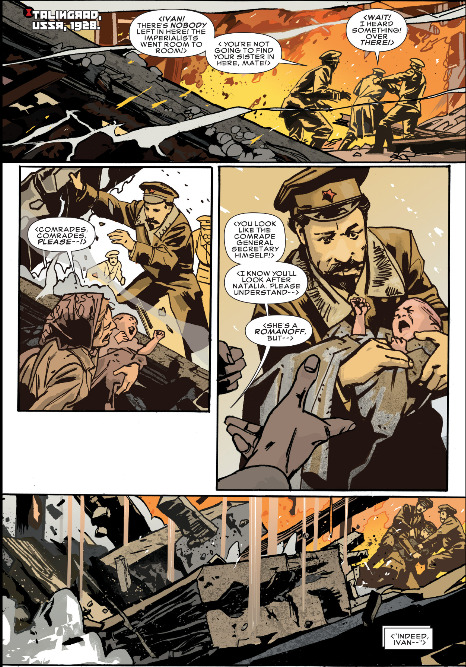
This alone debunks the adult/child misconception, but I want to go one step further and discuss the timeline of Natasha's time in the Red Room and the early years of the Winter Soldier.
At the young age of 20, Bucky Barnes "died" alongside Captain America in late 1945, in last days of the war. The Russian submarine discovered Bucky's preserved body after the war while hoping to retrieve Captain America’s remains. And with that, the Winter Soldier story began, along with his role as a super soldier trainer at the Red Room for Department X.
Now, one might say, "Ana, if he was 20, Natasha was 17, which is still kind of wrong, no?". My answer is yes; it would’ve been rather inappropriate. "Would’ve been" because there’s a catch: Natasha wasn’t part of the Red Room when he joined.
I know what you’re thinking: What the fuck, wasn’t she...? Didn’t she…? So let me explain that one from the beginning.
Natasha Romanoff, then 10 years old, was brought to the Red Room in 1938 by her father figure, Ivan Petrovich (a terrible piece of shit about whom I'll write a blog), Taras Romanov, and Joseph Stalin himself. After her trainer, Wolverine, killed Taras in 1940, she let Wolverine go, fled into the woods, and was found three months later by Ivan, possibly going back under his care, which can be seen below:

She returned to the Red Room only at the age of 28, ironically enough, becauseof Ivan, which is depicted on the following page:
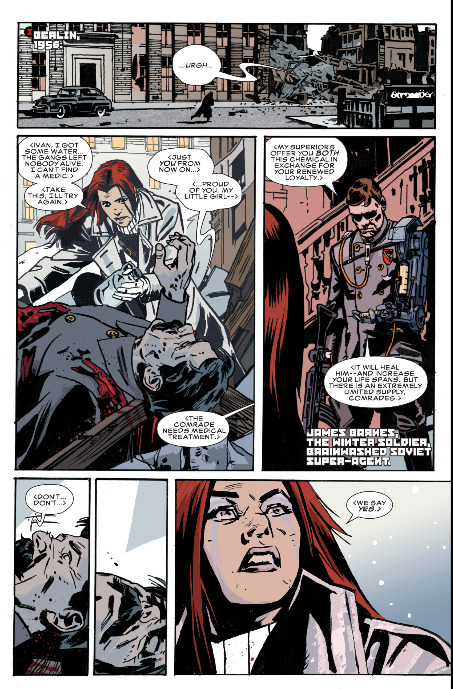
There, we find a collapsed building with a bleeding Ivan and a sobbing Natasha, who have been approached by …. *DRUM ROLL* …. the Winter Soldier, who has been sent by his superiors. They were both offered the super soldier serum that would save Ivan in exchange for their newfound loyalty, which Natasha accepted despite Ivan's protests.
Here we are, then: Natasha, 28, meets the Winter Soldier, roughly 31, who’ll soon be her lover and her trainer. Two adult people who met when they were both adults. And with that, we conclude our blog, disproving the infamous “she was a kid when they met!” argument.
Thanks for reading my blog. If you have questions or have found a mistake, let me know. I'll be happy to answer and discuss <3
#winterwidow#buckynat#natasha romanoff#bucky barnes#marvel comics#earth 616#616#MCU#marvel cinematic universe#anti winterwidow#anti buckynat#nerd talks#blog#explore#tumblr#lore
223 notes
·
View notes
Text
walk with me...
(i turned this into an au: masterlist)
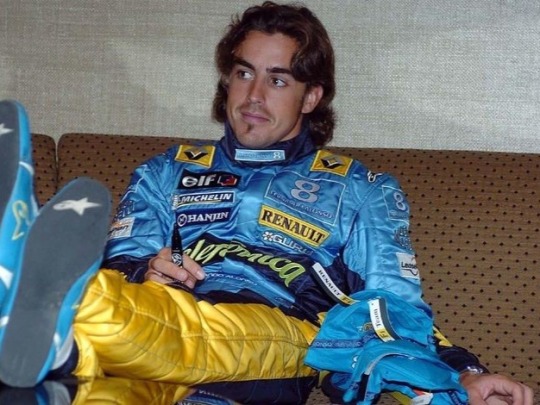

this is a very spur of the moment not well thought out au but... JUST LISTEN. (more under the cut & in my pinned)
Lawrence Stroll bought a team on the f1 grid in 2006
Renamed it Racing Point to secure a spot for his 18 year old son (and put him in pink bc hes so cute in pink)
Lance Stroll was born October 29, 1987, he started karting in 1991
Fernando Alonso was born July 29, 1981, started karting in 1984
When Lance made his debut in f1 there was a lot of talk around the paddock about the nepo baby and Strolls choice to have both drivers on the team be rookies. (Stroll and Rosberg)
During the first race of the season Lance got p6 and Nico got p7, both scoring points for the team
After the race Fernando Alonso went to congradulate the rookies, both stunned because the race winner was praising their work
Nico was honored to be congradulated by a world champion
Lance was... well. Maybe he liked the older mans praise more than he should've.
As the season progressed Fernando continued to find reasons to speak to the rookies, even though it was evident he cared more about what the brunette had to say.
After both Racing Point drivers DNF in the 2nd and 3rd races of the season Fernando made sure to try and lessen the pain.
Each time Fernando came to the Racing Point garage, each time he searched the paddock to find #18, each time he spoke it only made the 18 year olds heart grow fonder.
Lance thought the driver was like this to every rookie, so caring and comforting, but that just wasn't the case.
He was known for not going out of his way to do anything like he was doing with the Racing Point drivers.
After Lance got 6th in the 4th race of the season Fernando was the first to congratulate him, as if he hadn't just gotten second.
He noticed at the next race that he didn't go out of his way to congradulate Nico on his 7th place, he just went straight to him to comfort him about yet another DNF.
Before then he hadn't thought too much about Fernandos intentions or why exactly he was talking to him so much.
By this time in the season fans had started to notice how close the two had gotten, seeing how they naturally gravitated towards eachother.
When Fernando won the next race Lance made sure to beat him to it and congratulate the world champion first, loving how it brought a smile to his face.
Fernando didn't smile like that when others congratulated him, didn't smile like that when being asked about his wins, didn't smile like that when Nico said the exact same thing.
Lance felt insane for thinking this way but he couldn't help but feel a little special.
A few races later in America was the first time Fernando wasn't on the podium, the first time they spent the whole time after the race together.
It was nice, being in his presence, he felt like a sunbather in the sun anytime the older man spoke to him, it was silly but it was always his favourite part of the race week.
The next time he wasn't on podium was in Germany, he almost felt bad for feeling this way but he looked forward to the days when Fernando got p4 or lower because it meant they'd spend the whole afternoon together.
It was just like in America, the two of them just standing around going over the week and the last few races until Fernando asked him a question.
"Have you ever kissed someone?"
Lance laughed at the question, unsure where it came from
"Have I kissed anyone?" He asked back, wondering if it was a serious question
"Si, you do know what kissing is, no?"
Lance couldn't help but laugh again, he was 18 not 8, of course he knew what kissing was.
"Have you ever kissed anyone?" Lance asked, knowing for a fact he had, it'd be insane if not, how could someone so stunning not have kissed someone? How could someone with girls around him constantly have not kissed someone and more.
"I asked first, Lancito."
Fernando had called him that almost constantly since the season started yet every time it never failed to make the youngers heart flutter.
"No" He admitted, almost embarrassed "I'm not very good with people" he added, knowing the only people on the grid he could talk to easily were Fernando and Nico
"I could be your first"
(if this doesn't make sense pretend u never saw it)
#this is so bad#but i cant stop thinking about it#(i'm obsessed with renault nando and racing point lance)#(so ofc i had to find some way to put them together)#(even if it sucks)#f1#formula 1#lance stroll#aston martin#fernando alonso#racing point#renault#2006#nico rosberg#fa14#ln18#au#ff#rpf#alternate universe#strollonso#lance stroll x fernando alonso#is this real#does this make sense.#first kiss au
101 notes
·
View notes
Text
The Big AIDS Metaphor Post
In her essay "Why Are Americans Afraid of Dragons?" from her book The Language of the Night: Essays of Fantasy and Science Fiction, science-fiction and fantasy writer Ursula K. Le Guin writes—
"The use of imaginative fiction is to deepen your understanding of your world, of your fellow men, and your own feelings, and your destiny."
It would be easy for me to claim that Stranger Things is a show that utilizes its science-fiction elements as an AIDS metaphor, but that only goes so far without being able to prove that the show is in fact employing said metaphor. "The show takes place in the 80's -> AIDS was a big part of the 80's -> therefore the show is about AIDS" isn't an airtight argument in itself. I can quote famous sci-fi writers all day but that still wouldn't prove that the Duffers themselves are actually following similar trains of thought.
So here's my big long post about why the show is utilizing it's science-fiction elements as an AIDS metaphor.
Lengthy discussion of rape, violent homophobia and drug use below the cut.
A Brief History of HIV/AIDS in America
For those not in the know about HIV/AIDS, and in order to all get on the same page, here is a short recap. For my information, I will be this timeline from hiv.gov as well as this timeline created by History Channel, as well as some of the supplemental hyperlinks provided. Any other sources I use will be linked throughout.
HIV, or human immunodeficiency virus is a virus that attacks the body's immune system, making it highly susceptible to infection and cancers. The virus can progress to a more severe version of the infection, acquired immunodeficiency syndrome or AIDS. The virus spreads through bodily fluids such as semen and blood. The most common ways for HIV/AIDS to spread was through unprotected sex and sharing needles while using drugs.
The initial cases of HIV were present in America in the 70's but become much more rampant starting in the early 1980s. Because cases of AIDS were most commonly seen in gay and bisexual men, there was a large misconception that AIDS was a "gay plague" or a "gay disease" as it was nicknamed. By 1984, 3,500 Americans had died from AIDS related illnesses.
The reason that AIDS epidemic got as deadly as it did is often attributed to the Reagan Administration's failure to act, something that President Reagan denied. Reagan would not publicly acknowledge AIDS until 1985, despite U.S. health officials being aware of AIDS since 1981.
Understanding just how entrenched this metaphor is in the story will include going through each season and examining in detail how each one plays into this metaphor.
Season One: Establishing Metaphor & Government Cover Up in Early Years of Epidemic
The AIDS metaphor is most closely connected with Will's storyline, although it's not exclusive to Will nor is his storyline exclusive to AIDS. Furthermore, the supernatural elements of this show are multifaceted. AIDS is but just one of the metaphors expressed in the show, but for the sake of this post it's what I will be focusing on.
The setup begins following Will's disappearance in episode 1, when Joyce introduces Will's queer coding to us.
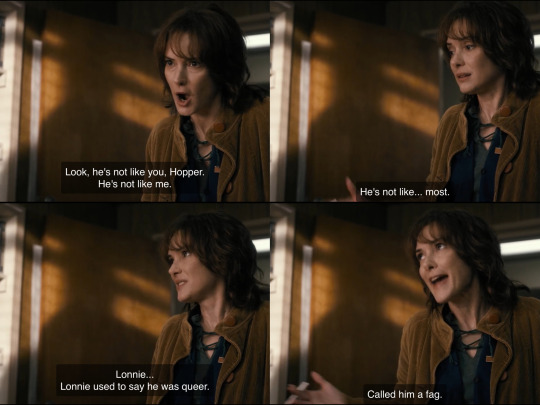
By 1983 the terms "gay disease" and "gay cancer" had been in the public vocabulary for a couple years now. So when Joyce brings up his queerness in regards to to his disappearance in a show that takes place in the early 1980s, there is a subconscious correlation that can be made in the watchers mind. His sexuality is significant to the why he went missing, otherwise why bring it up?
We then hear through Troy exactly what the town believes happened to Will.
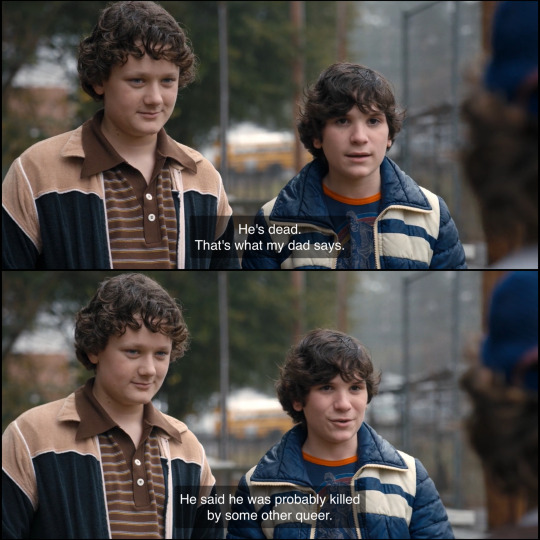
I think that Troy essentially being a mouthpiece for his father is significant to show that Troy's beliefs are not exclusive to him and they do not exist in a vacuum. Troy's homophobia is a product of his environment, which includes his home and by extension, Hawkins.
The specification that Will was killed by "some other queer" adds another layer under the surface of Troy's statement, one that implies that Will was raped before he was kill, otherwise, again, why bring up sexuality in the first place? This was the attitude toward gay men— they rape and kill little boys.
In early 1984, there was a study conducted by the American Journal of Medicine to trace the sexual partners of a cluster of patients with Kaposi Sarcoma, one of the common cancers that killed AIDS patients. The study identified a flight attendant as "Patient O" who was among the first to exhibit symptoms of HIV/AIDS and had a rather active sex life with a multitude of sexual partners. The study was soon misconstrued by the public to claim that there was a Patient Zero who was "a promiscuous or even malicious gay man who single-handedly and knowingly touched off the AIDS pandemic in the United States."
Another crucial factor of the metaphor is the cover-up and blame shifting from the government lab, the exact thing that allowed the problem to escalate and become as deadly as it did to begin with. In the early years of the epidemic, Reagan slashed the budget of public health agencies like the CDC, and it would be years until he ever made a speech about it let alone even mentioned AIDS publicly.
We see how adamant the lab is to cover up any supernatural involvement with Will's disappearance in an attempt to cover their own asses. Framing his death as an accident was their call, all while being acutely aware of what the actual problem was. This confrontation from Joyce to Brenner puts it pretty aptly.
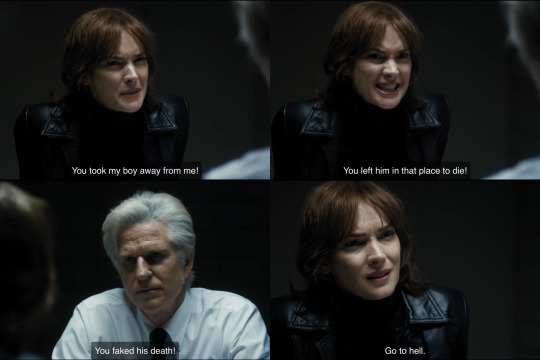
Tangent About Barb
This AIDS metaphor is something that I thought of when I first watched the show back in 2016 (humble brag) but what tipped me off the most wasn't Will or the lab but it was the fact that Barb was the other victim shown.
Barb's queer coding was clear to everyone and their mother. Hell, there's even a joke about it in the Bad Lip Reading of the first season. Barb, Nancy's short haired female friend who takes issue with Nancy's new relationship and has a hard time fitting in with with all of the heterosexual antics of Steve's house party. She's singled out, and while the rest of the gang get to casually enjoy the pleasures of sex, while Barb, another member of the queer community, sadly loses her life. The show cuts between Nancy having sex with Steve with Barb being killed to emphasize this stark contrast.
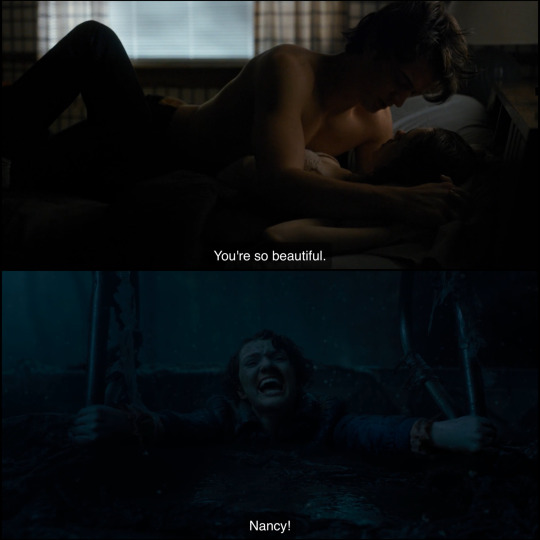
Season Two: Personal Effects of HIV/AIDS & Social Stigmatization
Season one was surrounding Will while not really showing us much of his pov, but season two dives right in to his perspective.
So, remember when I talked earlier about how Troy, and by extension the town, believed that Will was raped? Well, he wasn't exactly wrong.

This moment wasn't lost on me when I originally watched the show, although I think I ignored the implications because I didn't want to believe what I was seeing. But it's pretty well spelled out— A long, tentacle-like organ used for the sake of reproduction (Will "births" D'Art as a result of this), is inserted inside of Will's mouth without consent.
It's been a year, and Will is still dealing with the trauma of what happened, along with all of these new changes to his life. Will frequently attends doctors appointments at the lab, where the lab themselves aren't completely confident what is happening with him either.
When cases of HIV/AIDS were first appearing in the U.S., health officials were unclear as to what exactly this virus was and how it worked, only that clusters of otherwise healthy gay men were suddenly developing rare and aggressive infections and cancers.
Owens refers to the spread of the Upside Down very clinically— describing it as some cancer. One of the first articles published about HIV/AIDS in America before more information was known was a New York Times article titled "Rare Cancer Seen in 41 Homosexuals." The cancer the headline refers to being Karposi Sarcoma, the rare skin cancer developing due to their weakened immune system.

HIV/AIDS in itself isn’t the disease that patients die from, but instead the weakened immune system allows for diseases to take over the body without much defense. After his visit to the Upside Down, Will faces a series of “True Sight” visions as Mike puts it, which allows for a destructive foreign entity to invade Will's body and slowly take it over.
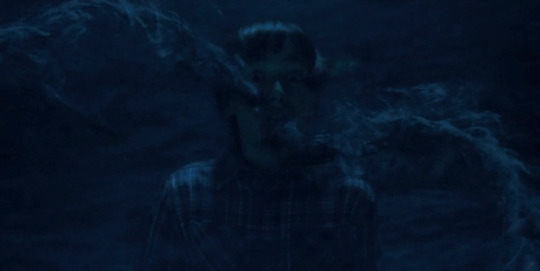
HIV.gov lists the following as some of the symptoms of AIDS:
"Rapid weight loss"
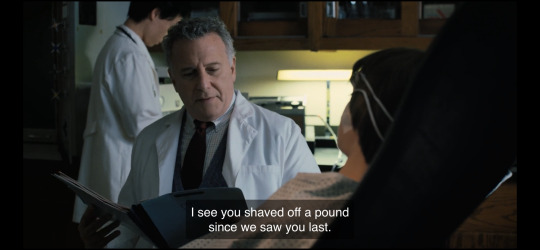
"Profuse night sweats"

and "Memory loss"

To the government agents in the lab, we see just how disposable Will is to them. In their words, if it kills him, it kills him. (thank you to @emblazons for being the one to point this out to me)
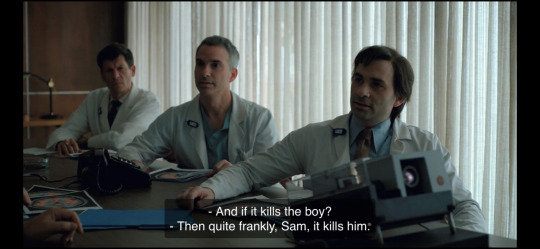
Owens may have held more concern for Will, but he still continues the government cover-up started by Brenner in season one. We also see the fallout of Barb's death, with Nancy and Jonathan fighting to uncover and reveal the truth. Owens is the one who tries to put a stop to their exposé of events to Barb's mom.

Not only is Will facing trauma and his body being ravaged by this new illness, but he's also facing social stigmatization, something common among gay men with positive HIV statuses at this time. There seemed to be some sympathy from the townsfolk when Will was missing and presumed dead, yet he faces animosity almost seemingly because he came back.
The "Zombie Boy" Nickname
I once made a whole separate post about this, but Will's "Zombie Boy" nickname from season two fits in with this AIDS metaphor.
On a surface level, the nickname is in reference to the fact that Will seemed to come back to life despite having a funeral and being buried. In a literal sense, however, his peers are quite literally referring to him a walking corpse that spreads disease. Individuals suffering from AIDS often have very short life expectancies, and zombies are the re-animated dead that aim to infect and kill as many people as possible. It is a very coded nickname.
In the post that I linked, I speculate the possibility that some people in town may even believe that Will has HIV. Remember earlier when I mentioned Troy's comment "he was probably killed by some other queer" which implies a belief that Will was raped. The town don't know about any of the supernatural goings-on, but they do know that Will went missing, was found in a cabin a week later, was hospitalized shortly after and attended frequent doctor visits through the following year. I don't see a reason that malicious rumors would cease, especially considering that they already continue to be cruel and ostracizing with the Zombie Boy nickname.
Look also at this moment of Will getting weird looks as he is being pulled from school to attend his doctors appointment. Why so much stigma around simply going to the doctor?
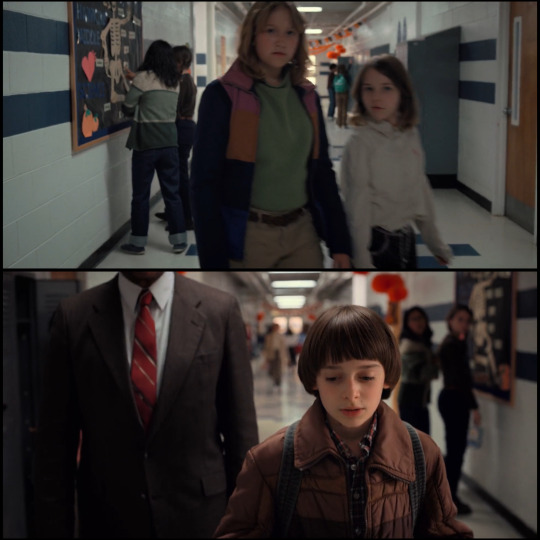
The 1984 Reelection of Ronald Reagan
In 1984, Ronald Reagan won reelection in one of the biggest election wins in history. And— subsequently continuing his and the governments silence towards the AIDS epidemic.

Season two takes place in the week leading up to the reelection. There are small set pieces that draw attention to this, such as this election sign in front of the library.
If the date November 6th sounds familiar, it should.
Dr. Owens mentions the anniversary of Will's disappearance. The one year anniversary of Will's disappearance is the same day that Ronald Reagan was reelected. Will's trauma is being purposefully associated with that day.
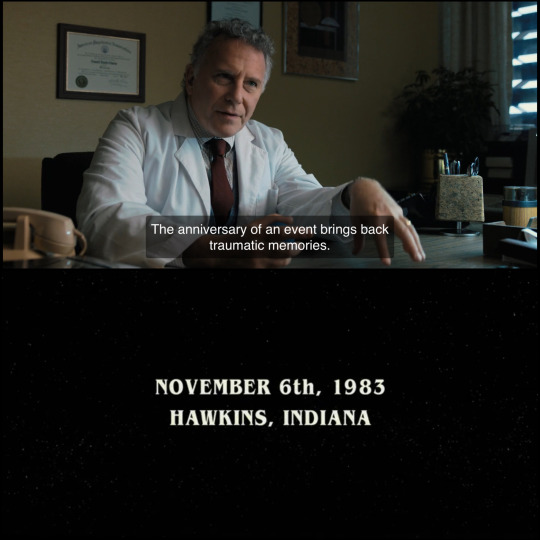
I've also made a separate post before just about the Reagan/Bush '84 signs that litter the lawns of Hawkins houses. They appear most notably in the Halloween episode, building to when Will has his true sight episode that night. There is one clearly in frame just before Will is separated from the group, called a "Zombie Boy" and a "freak" (two very coded nicknames) before he falls into his vision.
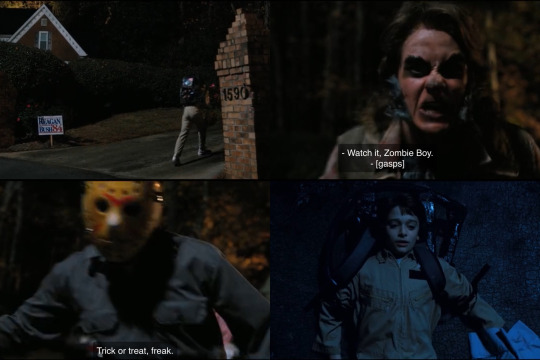
We also get a clear view of the Reagan/Bush sign outside of the Wheeler house before Will describes his experience to Mike.
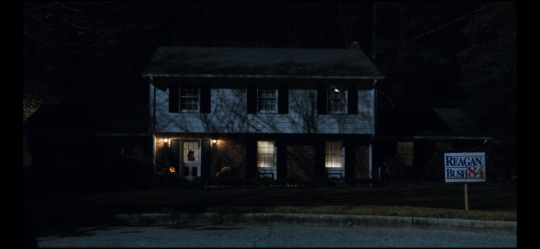
A Tangent About the Wheelers
And now the question on everyone's mind: Are the Wheeler's homophobic?
Ted and Karen Wheeler are not violent, homophobic bullies. That would be a massive reach. But it would also be a reach to say that they are vocal allies. And maybe that's just what the average middle class family
In the very least, the Wheelers are passively contributing to a system that enables homophobia. To be honest, they are probably just going along with what everyone else is doing. Like I said earlier, Reagan was an incredibly popular candidate for the 1984 reelection. The Wheelers have the privilege of being able to comfortably conform without having to worry about much of the consequences. (I'll talk more about the Wheelers later)
In the episode where Will is possessed by the Mind Flayer, Joyce calls the school and we get an extended shot with Reagan's portrait in the background. The shot begins with the portrait slightly obscured, then the camera dolly's in towards the receptionist with the portrait still in frame. Shortly after this Will is possessed in the field. Here is one of the camera begins the shot and where the camera ends the shot.
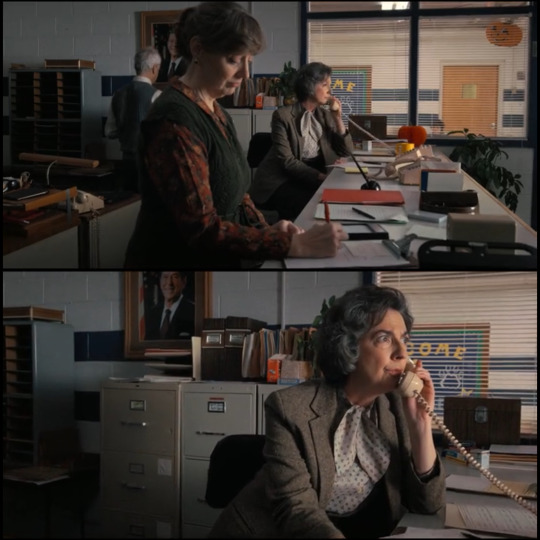
I also wanna note that when Joyce calls in this scene, the receptionist makes a side comment about her and rolls her eyes. There's a clear animosity towards not only Will, but the whole Byers family, including the adults of the town. Including Reagan's portrait in this shot is meant to create a subtle correlation between him and the stigma that the Byers' face.

Season Three: The Façade of Patriotism Over a Dying Nation
It's 1985, Ronald Reagan has been reelected, and this season introduces Hawkins Mayor Larry Kline.
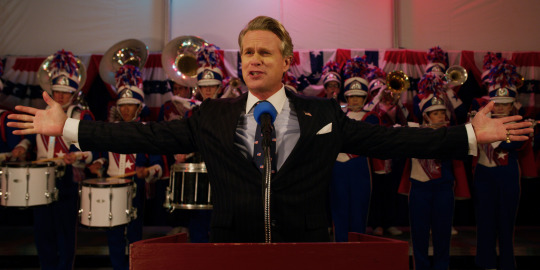
Is Larry Kline meant to be Ronald Reagan?
I would say that Mayor Kline is probably exemplary of American politicians in a broader sense (in fact the Duffers may have been making allusions to Trump with his connection to the Russians) although the fact that he's in office the same time as Reagan is still significant.
In the beginning of the season, Mayor Kline is being met with protesters outside his house, not unlike many of the AIDS awareness protests from the 80's.
The townsfolk are angered with Kline for building the mall and running some of the small businesses into the ground. During Reagan's run, he implemented a system of economics called "Reaganomics," which aimed to cut taxes and support economic growth. Although critics of Reaganomics will point out that his policies had actually increased the wealth gap, making the rich richer and the poor, poor. I want to keep this post about the AIDS metaphor, although I wanted to point this out as it is a connection between Kline and Reagan. And as I said earlier in this post, the metaphors are multifaceted and not just about AIDS.
But continuing, later in the season Kline puts on a big 4th of July festival to celebrate the independence of his country with neon lights and flashy fireworks. Meanwhile, the people of his town are dying right under his political reign.
During season 3, the AIDS metaphor actually moves away from Will, with the focus of his story shifting slowly to romance. This was setup at the Snowball at the end of season 2, and season 3 hints at some of Will's feelings for Mike which will be carried into season 4.
But the metaphor is carried on by Will's name twin, Billy.
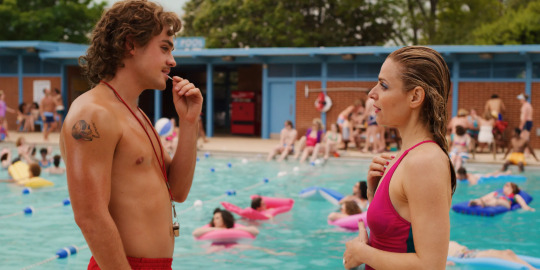
Billy and Will sharing the same first name, that being William, feels significant as Will basically passes the baton to him and Billy now becomes the focus for this metaphor. We learn from Max that Billy is very sexually active, and in the beginning of the season he has eyes for Karen Wheeler. It is while he is on his way to this illicit sexual affair when he is "infected" by the Mind Flayer. (this was pointed out to me in the comment of one of my posts, but have since lost it. If you are reading this— thank you.)
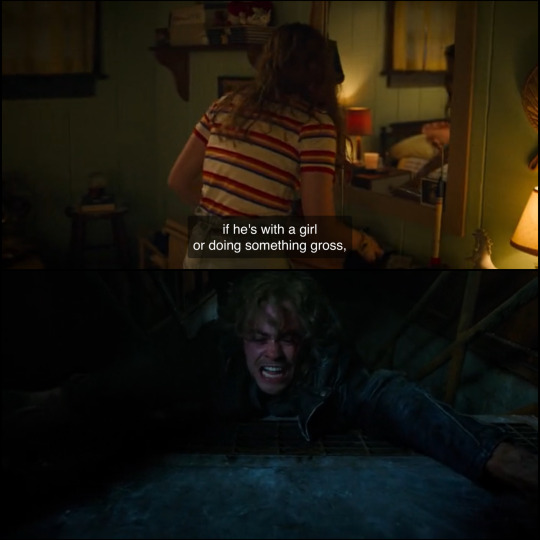
Billy then passes the "infection" along to a girl he was flirtatious with, before the "virus" begins spreading over town.
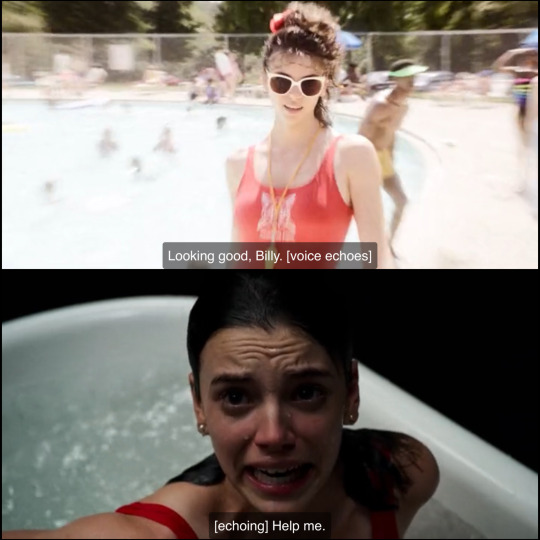
There is also language and rape imagery associated with being flayed. There is the repeated lines "hold still" and "it'll all be over soon." When Heather's parents are flayed, they are tied up something is forcefully inserted orally, not unlike what we saw with the tentacle inside of Will in season one and his possession in season two. (I first saw this pointed out by @kaypeace21

The flayed begin to eat chemicals, and Nancy makes the comment that Tom, one of the flayed, appears to have been on drugs. Another common way that HIV is spread is through the sharing of drug needles.
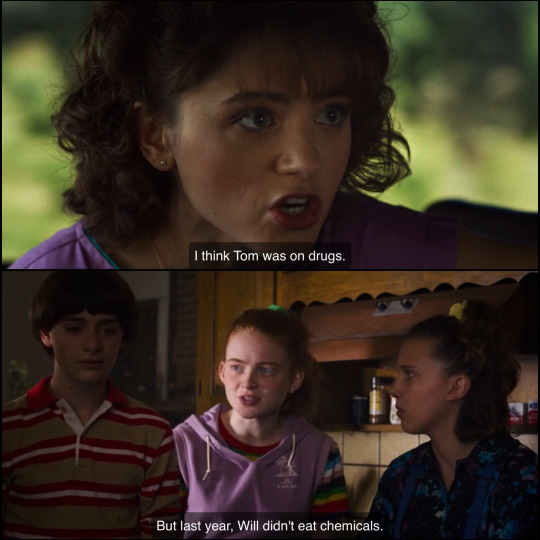
HIV/AIDS in the Press
Nancy's arc with the newspaper this season reminds me a lot of how AIDS was first being reported in the press. Nancy begins her search for a story with stolen fertilizer and diseased rats, not realizing that there was a much bigger and much more dangerous story at hand. One of the first reports HIV in the media was from a CDC Morbidity and Mortality Weekly Report from 1981, which cited five cases of pneumonia in previously healthy gay men in Los Angeles. While still a deadly number, it was relatively small compared to the massive number of AIDS cases and deaths that would soon follow.
When Nancy brings her story to work, Bruce, one of her higher-ups, sips from this rather patriotic coffee mug before telling Nancy to drop the story.

At the end of the 1985 summer in Hawkins, the flayed have died in a "mall fire" and Larry Kline is arrested for colluding with the Russians, and their patriotic façade is shattered.
In September 1985, shortly after actor and close friend of Ronald Reagan, Rock Hudson dies, of an AIDS related illness, Reagan makes his first public acknowledgement of AIDS.
Season Four: Further Stigmatization & LGBT Witch Hunting
In season four the town is finally privy to the fact that there is something wrong going on, although they are unsure of exactly what. When things begin to escalate, instead of blaming the actual guilty party, they go on an all-out witch hunt.
Once again, Will's pretty removed from the AIDS storyline in this season with his arc focusing on his romantic feelings for Mike. With Billy dead and Will out of town, the baton passes once again for the metaphor to be carried by Eddie Munson.
In the first episode of season 4, Eddie is reading a magazine with an article about the Satanic Panic, a real case of wide-spread hysteria in the 1980's regarding the fear of rising Satanism, supposedly promoted by D&D. The article links the game to violent behavior, Satanic worship, sodomy and murder.
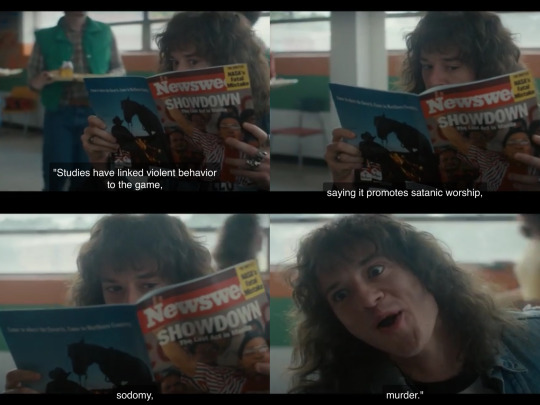
Tangent on Sodomy and Sodomy Laws
Merriam-Webster defines sodomy as "anal or oral copulation with another person." The definition is often expanded to include copulation with animals, although the term sodomy, according to Merriam-Webster, means "especially: anal or oral copulation with a member of the same sex."
While definitions may vary depending on states, some states have specific laws outlawing sodomy, even between consenting adults. In 1986, the Supreme Court upheld Georgia's anti-sodomy laws in Bowers v. Hardwick, after a homosexual man and his partner were arrested after being caught while having sex in his own home. Sodomy laws would eventually be challenged again in 2002 with the Lawrence v. Texas case.
While sodomy can technically can refer to both homosexual and heterosexuals, it is especially and historically has been used in regards to homosexual sex. When Eddie reads the word sodomy here, gay sex is being lumped in and made equivalent to violent behavior, Satanic worship, and murder. Quite literally in season four, Hellfire Club is seen as the evil Satanic sodomizers who bring death to their town.
While trying to find a substitute for the D&D game, one of kids Mike asks mentions 60 Minutes in his rebuttal of Mike's request. This episode takes place on March 21st, 1986. On March 16th, 1986, 60 Minutes played a segment called "Life and Death in San Fransisco," a segment about the AIDS virus on CBS. (EDIT: I originally attributed this to the wrong person, but thank you to @aemiron-main for being the one to point this out. Apologies for my memory mixing up my ST analysts in my head 😔) The archived footage can be viewed on YouTube.
When Chrissy is killed by Vecna inside of Eddie's trailer, leading the town to suspect that Eddie was the killer, she was going there to do drugs. Again, a common way for AIDS to be spread was through the sharing of drug needles. After the town and cops suspect Eddie, the town goes on an all-out witch hunt for him and other members of Hellfire, invoking Christianity as their reasoning. In Eddie's words— "Hunt the freak, right?"
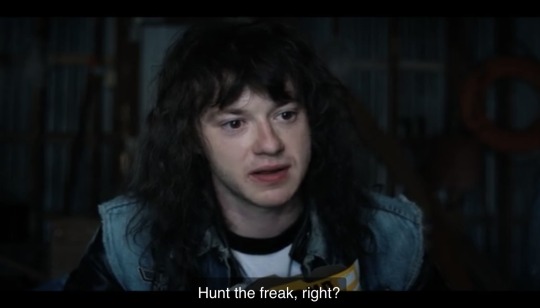
Does this mean that Eddie is queer?
The black handkerchief in his back pocket and Joseph Quinn's flirtatious ad-libs with Steve are not completely lost on me. And the AIDS coding here does seem to be pointing in that direction, but here's what I think.
Eddie's actual sexual orientation, and by extension that of Hellfire, is beside the point and doesn't actually matter in the eyes of the town. Every member of Hellfire could be straight and every member of Hellfire could be gay, but what matters is that Hellfire Club is a group of outsiders that participate in recreational activity that is deemed dangerous, and that in itself is queer, regardless of who they may actually be attracted to.
Another Tangent on The Wheelers
During Jason's religious spiel in town hall which invoked the witch hunt against Eddie and Hellfire, we get this shot of Ted and Karen Wheeler upon remembering that Mike is a part of Hellfire. And boy do they look terrified.
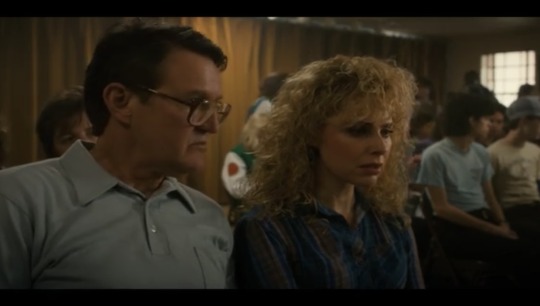
This moment, right here, is what I believe to be the Wheeler rug pull. They may not have been signing up to witch hunt their son when they put that Reagan sign in their front lawn, but this is what it leads to. They're being confronted with the most extreme end of their forced conformity and they fear what they see. I think part of what causes this change in character is because they know Mike, had Mike not been a Hellfire member, who is to say if they would have changed their tune or join in the witch hunt. At the end of the season, when the news reports that the giant gate in town is a "doorway to Hell," both Ted and Karen scoff at the report, calling it "hysteria." The conformists are beginning to un-conform.
Concluding Thoughts & Season Five
Providing a story about HIV/AIDS through a science-fiction metaphor is both practical and ethical. The metaphor allows the show to tell the story to a wide audience without the reliance on outside knowledge. You don't have to be an expert in HIV/AIDS history to understand the story that it's trying to tell. It's ethical as well in that it doesn't force it's incredibly young actors to have to act out being raped and developing HIV/AIDS.
With Eddie Munson dead and Zombie Boy back in town, I think that the AIDS metaphor will shift it's focus back to Will. I think we may see a colliding of the AIDS plot with his romance plot. How do you pursue romance with a HIV+ status? Can you?
The way I see, season 5 has the choice to go in one of two directions:
But first, a short tangent about my uncle
In recent years, I came to learn that my uncle was HIV+, something that wasn't known to me when I was younger. Him and his partner are both in their sixties, and they currently bought a plot of land in which they plan on building their dream house together.
But anyways, the two choices are this:
Will dies by the end of the season. He becomes one of the many gay men with HIV/AIDS who lived a short life, unable to grow into adulthood and pursue his love life. His story is a tragedy.
Will lives. He becomes one of the many gay men with HIV/AIDS who survived and is able to live a long and happy life full of love. His story is an uplifting one full of hope.
Tagging: @emblazons @italiantv @gaysmindpalace @ven0moir @punkwillbyers @mikesbasementbeets @quinterobb @drangues @basiltonpitch @howtobecomeadragon
#stranger things#stranger things analysis#st aids metaphor#tw rape#tw drug use#tw homophobia#okay. after much teasing and putting it off. it is done#if you ever expressed any mild interest in this post then i tagged you#but also apologies if i missed anyone#edit to tags btw i probably did not cover everything just everything i felt most confident on. i know this topic is probably pretty expansiv#if you have additions feel free to add!!
337 notes
·
View notes
Text
One thing I love about the harringrove fandom is the agreement both that Steve is dyslexic and Billy is a MASSIVE reader.
Because while Steve’s always been surrounded by teachers or his parents or exes who either believe that he’s incapable of appreciating reading or that he just doesn’t care, Billy thinks that’s bullshit.
Because when Billy gets told to tutor Steve in English, he doesn’t start with a book for toddlers or fucking Shakespeare. They start with Billy reading him Wuthering Heights.
And at first Steve does not fucking get it. He doesn’t understand the plot, the message and especially not the dialect. But he finds himself enjoying it a lot. Billy’s a natural storyteller. He could be on stage.
Billy’s taste in books is both eclectic and weird. He’s reading Finnigan’s Wake for fun. In Irish. He likes Portuguese romance books and German surrealism and a lot of George Orwell. So much so that Steve kind of feels that love rubbing off on him.
He’d used to like reading. Before he was told he was doing it wrong. And even though he despised the books set by Hawkins High with every fibre of his being, there was this fire set in his belly, a want to impress Billy.
So he starts with The Hobbit. Eddie “Freak” Munson’s the only other dyslexic Steve knew and he loved that shit. How hard could it be?
The Hobbit is fucking difficult. It starts with a map, Steve thinks is in Elvish and some of the chapters feel like they go on forever. The words still bounce around the page and switch constantly. He likes it though. It’s weirdly fun as a story and he finds himself rooting for Bilbo.
Henderson can never know. That is the one thing Steve is certain of.
Billy doesn’t laugh when Steve tells him that’s what he’d decided to start with. He just rolls his eyes, not meanly and says he used to read that with his mom. Back in Cali. Before Neil fucked everything up.
Billy reads a lot of Oscar Wilde. The Importance of Being Earnest is constantly tucked into his back, dog eared and well loved. Steve knows enough about Oscar Wilde to know what that indicates.
Billy’s a poof. A faggot. A queer.
Billy is like Steve.
He doesn’t have the courage to look out for anything gay. Nothing even that hints at the matter. Steve knows that his dad has The Iliad tucked away in his office. He’s away on business while his mom sits in the kitchen and complains about America. Even after 15 years in the States, she still misses Poland.
His daring heist after she goes to bed leads to him sitting on the kitchen floor, crying about Achilles and Patroclus. Billy’s right, classics are a fucking bummer.
Steves not as stupid as other people think. He knows that if this were a book, him and Billy are hurtling towards deaths door. Even in real life, he’s seen the guys on tv, worn down to the bone on hospital beds.
Gay does not equal a happy ending.
He resolves to never touch The Iliad again.
Billy comes to their next session with a black eye and his mullet chopped off. They don’t talk about it.
1984 is depressing. And surprisingly apt for how Steve feels that his 1984 has gone. He does feel like he’s constantly being watched. Like being in love is illegal. Like saying anything too far against the government will have consequences.
Steve asks if Billy thinks Orwell wrote 1984 about America or Russia. Billy snorts but doesn’t answer.
That’s the note they end on for the year.
Christmas comes and goes. So does New Year. Two months of not seeing Billy aches in his gut.
Then he comes back.
It’s the middle of February. Billy’s been kicked out for a week. Steves playing nursemaid.
He’s beaten up pretty bad. Still, Billy insists he’s had worse.
Steve hedges around asking why it happened. Like the confirmation might suddenly make the full scope of their plight real.
Still, eventually Steve asks. Billy looks at him like he’s particularly simple.
He’s gay. Obviously Steve. And he actually has the balls to go out there, meet men, dance. Even if it does mean getting caught by Neil.
During his explanation, Steve notices they’ve gotten closer together. Like significantly closer.
They’re grazing hands. Electric.
Then Billy moves.
Billy kisses him and Steve’s world turns into a fucking supernova.
They kiss and it doesn’t make Neil vanish in a puff of smoke, it doesn’t make the shopkeepers who sneer at his mother go away, it doesn’t make Steve magically able to read.
But it does make Steve feel like maybe they’ll survive.
#billy hargrove#steve harrington#harringrove#harringrove ficlet#dyslexic steve harrington#tw homophobic language#tw abuse
61 notes
·
View notes
Text
The Death of Media Literacy, Religion, Misogyny, and Cognitive Dissonance
Spoilers for Dune Part 1 and 2 and the Ballad of Songbirds and Snakes
I'll admit, I have not read the Dune books yet, but I am a huge fan of the Dune movies. Not only did Denis Villeneuve just make two incredible, epic movies with a lot of nuance, gorgeous visuals, and an incredible score by Hans Zimmer, but the story itself is really compelling for a lot of reasons. My mother had tried to get me into Dune when I was younger, but at the time it wasn't my thing. I really liked Part 1, but Part 2 was something else entirely. I was gripping my seat the whole time, genuinely enthralled by everything happening. But I came out of the theatre with one definite conclusion: Paul Atredies is not a hero. I shared my thoughts in the car, and while my boyfriend agreed with me and my father had no opinion, my mother adamantly refused. She read the first book in college, and loved the 1984 version of the film (watching that, in my opinion, was like slow cooking your eyeballs over a campfire, but it was cool for the time period I guess). She was insistent he was the hero, and then tried to say that they changed the story to make him seem more like a villain, but he wasn't in the first book.
No hate to my mom, it's been a long while since she read the first book, and me and her are going to actually read the whole series soon. From my understanding and the research I've done, Frank Herbert wrote Dune as a cautionary tale against white saviorism and a commentary about America stealing oil from Middle Eastern countries and their subsequent colonization. I've also heard it was meant to be a standalone originally, but because people were portraying Paul Atredies to be the hero so much, he then wrote Dune Messiah to further drive home the point he was originally trying to make. But even without the knowledge of the books, it was apparent to me that he was not meant to be a hero in the movies. Of course, it isn't spelled out for you, and Timothée Chalamet does have some really epic, badass moments. But one of the biggest clue that you can have to what's going on is Chani, and how she reacts. She loves Paul, and she supports him, but she doesn't support him becoming a religious figure that leads her people because she feels as though that level of fervent religion is dangerous and not right; she says that a born and raised Fremen should be the one to free their people. You also see a huge shift from how Paul acts in the first movie and the first part of the second movie to how he acts after he drinks the Water of Life. In the first movie and first part of the second, he refuses to fulfill any prophecy, and tells them that he is not the one they are looking for. He is only wanting one thing: to avenge his father and his house. He even gets into an argument with his mother, Jessica, and he tells her that the Bene Gesserit were the ones to perpetuate this prophecy for their own gain. He knows it isn't real, and that it isn't divine, and that he was raised by Jessica to fit the qualifications for this prophecy for her own gain and the gain of her order. He knows what will happen if he takes up the mantle of Lisan al-Gaib: holy war spreading across the galaxy in his name. But when he feels like he has no other choice but to drink the Water to rally the Fremen to fight the Harkonnens, things instantly change. He becomes arrogant and demanding and self-confident, completely uncaring of how Chani feels and becoming solely focused on becoming Emperor. The line "lead them to paradise" felt really, really gross upon delivery, partly due to Hans Zimmer's masterful score. It feels damning.
While looking like a white savior story at very simplistic face value, Dune: Part Two is in fact a critique of it, even without the addition of Dune Messiah. The other big thing that the movie critiques is religion, especially blind faith at the cost of your critical thinking skills, religious fanaticism and idolization, and how religion is taken advantage of by people in power or people who want to be in power. Now I've seen a lot of tone deaf critiques of Dune, and a lot of ignorant comments made, usually in regards to the racial and political elements of the story. I have also seen a lot of people who get it and were able to help me expand my reasoning for the feeling of wrongness I got from people thinking Paul is a hero. But nothing compares to the TikTok I saw today. Someone blended the audio of Timothée Chalamet's Wonka character introducing himself, with the scene after Paul drinks the Water and goes to rally the Fremen to fight for his cause. The first image in the slideshow was an image of Wonka with the caption "Being raised in a religious household and calling yourself 'a Christian'." The second slide shows Paul in the midst of his religious fanaticism in the movie, with the caption "After being born again and having your entire worldview change."
Absolutely no hate to this creator if you know who I'm talking about, but this video quite honestly had me gagged, for lack of a better term. I was absolutely shocked at not just the usual lack of media literacy that revolves around this movie and so many others, but the fact that they were so far gone from the point of the movie and Paul's character entirely that they thought it was a good idea to post that online in reference to their own faith. Paul Atredies took advantage of a prophecy that he knew was engineered to control the Fremen to do exactly what the Harkonnens wanted to do, just in a different font. His intentions might have been good to start, but ultimately, because of Jessica and the Bene Gesserit (specifically the Reverend Mother, as she talks to him in his visions and pushes him forward), who he realizes he is being manipulated by, he ends up where he is: a religious idol who (Spoiler for Dune Messiah) leads 61 billion souls "to paradise" and causes irreparable damage to the galaxy.
As someone who was raised Christian, I can tell you without a doubt that religion in general, but especially Christianity, can heavily damage your critical thinking skills and media literacy. When you look at everything from the lens of, "Ok but how does this piece of media validate my feelings and beliefs regardless of intention, subtext, or true meaning?" you end up falling into some really dangerous territory. Paul is not meant to be venerated in any way, shape, or form. He's a badass character and Timothée Chalamet did an excellent job portraying him, but you should not be comparing yourself to him, especially in the context of your religious journey. That is incredibly dangerous as you then shut your eyes to the true message of the story: white saviorism is bad, colonialism is bad, exploiting entire peoples for resources of any kind is bad, and spreading and using religion to control people is bad. Of course if you phrased bluntly any of these things to religious people they would (probably) agree that those are bad things. But when you put it into the context of film/literature/music/etc, and then you have no one spelling things out for you like you're used to people doing for you in your religion, and you've already tossed your critical thinking skills out the window in order to avoid doubting your faith, you end up supporting and turning a blind eye to the bad things that you would otherwise disagree with if it was made simple for you. Even if you have no ill intention, even though it was just a silly TikTok, the ease in which people delude themselves by refusing to look any deeper into media causes such mass amounts of complacency and allows history to repeat itself. It is repeating itself right now. When we learn about the Holocaust in school, everyone would say that if they were Germans living in Germany, they would have opposed the genocide of the Jewish, Romani, and queer people during WWII. But here we are, watching the genocide of the Palestinian people live on our phones, and yet people are still sitting in denial and complacency, and often using the Bible and religion as an excuse for why its' ok.
Steering away from the topic of religion, another clear example of media illiteracy recently was The Ballad of Songbirds and Snakes. I both read the book and saw the movie (full book review posted on my book review blog @385bookreviews). While in the book you get Coriolanus' raw thoughts and it is made more obvious that he is not a good person even without the influence of Dr. Gaul, the movie still does a really good job of showing his decline into the person we see in The Hunger Games trilogy. And yet somehow, even with the context of the first three Hunger Games books (and the four movies), somehow people were still painting Coriolanus as the misunderstood good guy of the story. The latent misogyny that came out of so many people, especially women and girls who claim to be feminists, by saying Lucy Gray was manipulative and everything was her fault, was honestly appalling to watch. There is always room for personal interpretation of media, however that is widely different from purposefully ignoring canon information and editing the text to adhere to your own cognitive dissonance. This can once again come back to religion, as I believe people of every organized religion also practice this habit of picking and choosing whatever they want from their holy texts and then conveniently excusing the rest of it.
Media illiteracy is shown in another way with the Hunger Games series fans as well. A lot of people can go to the movies or read the books and root for the rebelling protagonist and recognize perfectly the plot of the story: government bad, so good people rebel and fight for their freedom, and those are our heroes. And yet these same people will then turn around and ignore genocide because "the oppressed people attacked first, they should have stayed peaceful".
While not all media reflects real life, or is meant to be taken as seriously, The Hunger Games and Dune are definitely not two of those series. By ignoring the context and subtext and purely engaging with things as fiction, and then ignoring the real life applications and implications of the work, we are being purposefully and consensually blinded and allowing ourselves to become mindless cogs in a capitalist machine. We all need to learn to think for ourselves, now more than ever, and that starts with our media consumption.
#dune#dune movie#dune part 1#dune part 2#dune part one#dune part two#media literacy#the hunger games#the ballad of songbirds and snakes#deconstructing christianity#exvangelical#cognitive dissonance#pro palestine#free palestine#free gaza
51 notes
·
View notes
Text
I'm finishing up my rewatch of season 3 of The Boys before I begin my SPN rewatch (got 2 more episodes left) and watching Jensen's performance as Soldier Boy just absolutely floors me.
It floors me because I've seen antis time and time again claim that Soldier Boy/Ben was essentially Dean in a superhero suit, that Jensen has one note acting, that he watered down the character by refusing to do scenes that made him uncomfortable (especially by one anti blog in particular who claims to be an acting expert, you know the one), and that his acting is very bland.
But in studying his performance because I'm studying the character (for writing purposes), these people couldn't be more wrong. I will admit that the only time I got a semi-Dean vibe from him was during the scene where Soldier Boy tells Butcher about his father. Which doesn't surprise me because Jensen himself said he leaned into the Dean/John dynamic for that scene.
But otherwise, I don't see anywhere where their claims hold any water. I mean, have you actually watched his scenes?
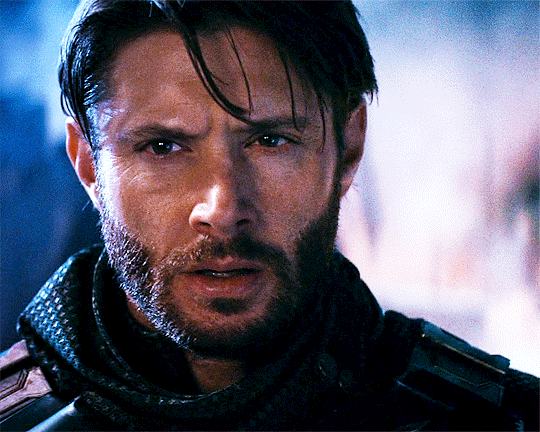
This scene is so important. Annie is getting ready to face off with this guy and even though she knows he's dangerous (after seeing he results of one of his explosions up close and personal), but she has no idea how dangerous, not really. This isn't Dean. This isn't Beau. This is the dangerous side of Solider Boy and had Hughie not intervened, there's a good possibility shit would have gone even more sideways. Especially, with Ben coming off of the confrontation with Countess, her hitting him where it hurts the most (meaning she tapped into one of his biggest insecurities. That explosion wasn't an accident (like NYC or even at Herogasm with the Twins). Ben didn't black out here. That's shown to us by there being no Russian trigger, despite him learning that Countess and his team handed him over back in 1984 and didn't even get paid for it.
I mean, look at this expression right here. His body is moving but his eyes don't. He's getting into position, ready to take out the next threat. Only when Hughie steps in and Annie's eyes dim does he step away, assessing her as not a threat. This is the weapon that is deadly enough to take on Homelander and no matter where you stand on Jensen as an actor, he pulls it off here.
The physicality he utilized in this role speaks volumes. And it's not about Soldier Boy being a Supe or being in a suit or having to look pissed off all the time (minus the few times he's amused). It has to do with how he embodies that character, carries him, and if he pulls it off. Spoiler alert: he did.

This scene exemplifies exactly what I'm talking about. I have watched it countless times and this part of it always sticks out to me every single time. Look at that expression, look at the eyes. Ben is not going all out to sell this belief let's call it to Hughie. He's giving him a look that says "this is the truth and you better believe it or else". He's not smiling for news cameras or doing propaganda or greeting fans of his movies decades prior. He's not selling the Soldier Boy is America's Greatest Hero image here. He's subtly threatening Hughie, and this is where he begins to have an issue with him. Because Ben wants to see himself as the good guy, something Kripke, Jensen, and the cast have talked about in promoting the season. In his own mind, he is the good guy; he's a legend in his own mind so to speak. He's bought the hype about himself. And anyone who doesn't see him that way is an enemy aka a threat.
It doesn't mean he doesn't know he's doing things that aren't right (as we saw in those outtakes of the 'Don't-do-drugs' commercial). He's very self-aware but he justifies it to himself because he's Soldier Boy and almost like Homelander always says, he can do what he wants. Not necessarily that he has a god-mentality that rivals Homelander's but everything is justifiable in his mind because he's a Supe, or more precisely the Supe, and he's protecting his country. And it also keeps that insecurity of being a disappointment at bay that he has from his childhood. It's all layered into his make-up so to speak. So not only is Hughie a threat (not physically obviously but to Ben's image of himself) but is also bordering dangerously close to reminding him of the very thing he hates: a mirror that reminds him that maybe his dad was right about him (not saying he was, I'm saying this is potentially what is running through his mind). So not only does it share a brilliant parallel between Hughie and Annie when it comes to Soldier Boy that eventually plays out beautifully in the Tower Scene in the finale, but it also is sewn into the issue between Hughie and Annie this season in their own relationship.
But the way Jensen plays that scene is phenomenal because if you watch it, you realize if Hughie says one wrong thing, he may be in trouble.
Which is then continued in this scene:

In this scene, Hughie is mentioning there's a lot of people inside Herogasm and here we get Ben's reaction to Hughie saying that. Then he tells Hughie as long as the people stay out of his way they should be fine. But again, watch how he says it, his expression, focus on his tone, his body movement. He clearly is not happy that Hughie says this (it literally is a continuation from the hotel room scene) and again has that subtle threat vibe, even with Butcher standing there (because let's face it, to him, even with temp V, Butcher is no threat). And of course, we all know the slap scene and the punch scene that happens later. Not only does Hughie get switched out for Ryan later on who Butcher ends up protecting from Soldier Boy, but it all plays out beautifully as all of the connections, overt and subtle, unfold throughout the season.
But back to Jensen's performance. There is so much to appreciate in how he fully embodied this character. And that's not saying it through an AA haze of "omg he's so hawt!" or "omg did you see his ass?" That's appreciating the amount of work that he put into this role when the cameras started rolling. He literally became Soldier Boy and he embodied him even outside of the suit.
As an actor, Jensen is very nuanced. He consistently adds in these little things that help make the character even more multi-dimensional than what is written on the page or what is called for int he scene and how it's blocked. This is why there is a certain small group of people on here that repeatedly talk about Jacting Joices, it's not just related to Supernatural or Destiel or Dean. It's about Jensen as an actor, as a performer, and how much he actually pours into these characters he plays. Whether it be the way he moves (or walks), or the expressions he uses, his eyes (yep, he does that too, see above), with his hands, even down to the way he delivers a line. All actors do this in their own way obviously, lean into physicality as well as their performance, but he definitely has his own unique style that I just don't see anyone else replicating. I think there's a reason so many people say no one else could have played Dean the way he could have for example. And if you watch his characters, really watch them, you'll see what he does each and every time. Even smaller characters like Jason from Smallville or Tom from My Bloody Valentine or Alec from Dark Angel. It's all right there on the screen.
So I guess my whole long point is I don't get why antis rip him apart when it comes to this role of Soldier Boy (other than being antis I guess) or say he can't act or that has no idea how to properly analyze his character because he actually did put a ton of work into this specific character (as well as all the others he's done) and you can clearly see it as you watch his scenes in the show. While I wish we could have seen Homelander and Soldier Boy go at it a bit more, and see Soldier Boy truly unleash that Alpha-ness of being the original Supe like had been talked about in promotions and interviews, it doesn't diminish that this character was fascinating and he brought it to life from the script in a way that complemented his own unique style as a performer.
tl;dr Jensen crushed Soldier Boy and Ben (yes, two different characters to embody actually) and I cannot wait to see more of him in any future Boys-related visual story telling, on the show or others.
#jensen ackles#jensen ackles appreciation#anti antis#the boys#theboysposts#soldier boy mention#on a completely related note#the boys is awesome#i seriously love this show so much#just more of kripke's brilliance shining through#rewatching and i'm seeing even more parallels throughout season 3#just so well done#though i could have lived without THAT scene#kripke you sick fuck#if i ever see you in a sushi restaurant i am RUNNING
187 notes
·
View notes